shield



New policy sends students to lunch detention if they are late three times in one week page 3
Campus modernization set to start but also to occur in bond cycles over 15 years page 14
EDITORIAL: Rapid rate of school policy changes erodes student trust, campus norms page 27

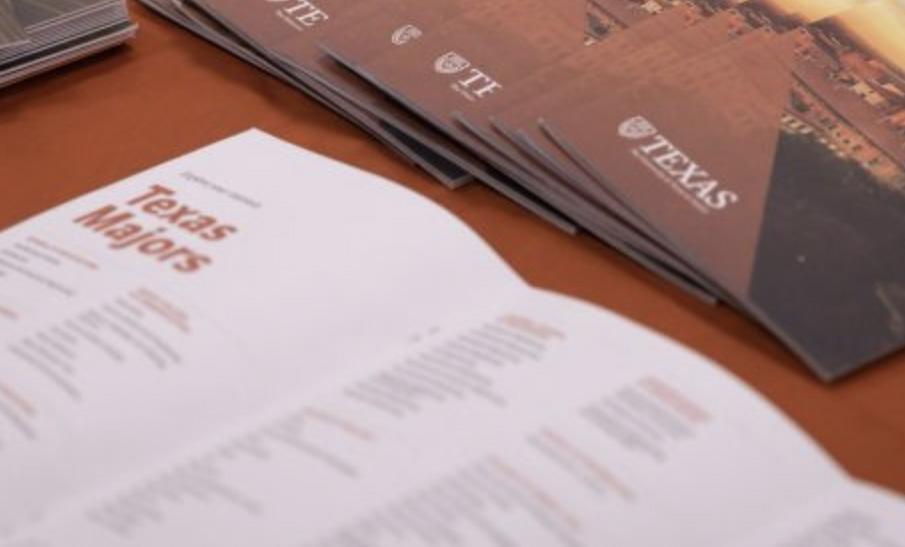
Students with more than two tardies in one week face lunch detention as a result of a new tardy policy implemented on Feb. 12. The administration enacted the policy to encourage punctuality to classes after noticing an increase in tardies this school year.
The policy states that administration will be “monitoring attendance very closely” in order to ensure punctuality. Students have the six-minute passing period to get to class, and may get up to two tardies per week “without penalty.”
clearer than they did a couple weeks ago.”
Assistant principal Teri Kirby said that there were 107 fewer tardies during the week of March 1 compared to the week of Feb. 23.
Baxa says this is not the first time this policy has been in force. The administration last implemented the policy during the 202122 school year. According to Baxa, the policy was discontinued to decrease the workload on the administration after the admin team was reduced from five to four administrators.
“ I mean, just look at the halls. They look clearer than they did a couple weeks ago.
If students receives a third tardy, their name will appear on their “administrator’s discipline list.”
If a student continues to appear on the discipline list, the consequences increase after the first appearance on the list. A third appearance on the list results in one week of lunch detention and a parent
principal Andy Baxa ”
“We saw improvements in tardies [in 2021-22] and work increase for AP’s so their attention shifted somewhere else,” Baxa said. “After ‘21-22 we went from a five-man team to a four-man team of AP’s and so that shifted a lot of the responsibilities around the team and increased the workload for every AP in the team, so we had to take something off their plate at that time.”
Though deemed effective by administrators, many students have criticized the policy.
“I think [the tardy policy] is ill-advised to say the least because I
order] to avoid a week of lunch detention,” senior Carys Blaney said. “If I am late for class, and I know I’m going to get a tardy, I myself am going to skip because they aren’t going to do anything about that absence, but they will put me in lunch detention otherwise.”
Blaney received a lunch detention on Feb. 23.
“I honestly have no idea what I was tardy to,” Blaney said. “It has thrown me off because for me it’s like they suddenly care about something that has always been relaxed and not too big a deal. I’m getting punished for something I didn’t even know I was doing poorly on.”
“They cannot get that by not going to class. You need to be in class in order to get whatever we have to offer as far as education goes.”
Baxa says that the first attempt to address chronic tardiness was from the ground up, but that the administration has since resorted to a topdown approach due to lack of improvement.
“ I think [the tardy policy] is ill-advised ... because I know that people will start skipping classes they are tardy to [in order] to avoid a week of lunch detention.
senior Carys Blaney ”
Lunch detention takes place in Room 138, Deborah Gardner’s classroom. The policy has led to more students arriving to her classroom during lunch. Gardner believes the policy will become effective.
“I agree with the tardy policy because I feel that the administration is trying to do something to instill in the students’ heads that they are here for
“[The initial idea was] supporting individual teacher’s classroom policies in relation to tardies,” Baxa said. “It just wasn’t working. We needed something more top-down rather than bottom-up.”
Though students have criticized the policy as strict, Baxa added that assistant principals are willing to work with students who have extenuating circumstances that lead to tardies.
“There are always going to be mitigating
Being on the two-or-more tardy list once or twice results in lunch detention.
The third appearance invokes a week of lunch detention and the fourth, ISS. Graphic by Sophie LeungLieu.

Last spring, AISD and the special education department came under supervisions of the Texas Education Agency for over a thousand backlogged evaluations due to short staffing issues in the department. AISD successfully advocated for an alternate plan that installed monitors, instead of conservators from the TEA with the condition of providing monthly reports about the district’s progress and milestones laid out by the TEA Corrective Action Plan.
AISD said in a Feb. 13 recent press release that the district had cleared the entire backlog of evaluations, but Superintendent Matias Segura said in February 2023, only 23 of the 70 positions needed for evaluations were filled. Segura told the Shield in an interview on Jan. 23 that AISD is still working to fill positions.
“We haven’t been able to fill all those positions,” Segura said. “So now as we work with the board for the spring semester, the question becomes what other thing are we going to do to get to where we are fully staffed and able to support all of our students.”
Special education science teacher Margaret Smith explained the importance of current evaluations for students.
“What evaluations do is tell us what students need,” Smith said “They tell us what’s going on with their learning differences or their emotions. … If teachers don’t have that current information, then we don’t know enough about our kids.”
Special education teacher Richard Salazar explained the effects of COVID-19 on the special education department.
“I still think we’re feeling the effects and still trying to bounce back,” Salazar said.
Assistant principal Tami Ballard described the plan of action for tackling the backlog of evaluations. One component of the plan is to use external sources for recruiting evaluators, who are reported to be working almost six days a week as well as through the summer.
“I think we’ve hired some wonderful people, and we’re pretty well staffed and [they’re] working as hard as they can,” Ballard said. “We all have areas of growth that we can grow in and really just keep up with best practices.”
Ballard further explained the details of the new monitorship, directly affecting McCallum staff who are taking extra courses to accommodate special education students.
“They are taking classes outside the school day, learning about how they can support special education,” Ballard said. “What I love about it is it’s really best practices for all kids.”
MacJournalism gives to the McCallum community 365 days of the year, now is your chance to give back. By posting on our Instagram and website daily as well as producing six print issues of the year, MacJ is always working to inform our community.




Smith also stressed the large benefit for general education teachers and staff across the district and McCallum specifically.
“I do feel like they have come in and provided resources and support for general education teachers that have really helped them understand what we are doing in the special education department,” Smith said.
Salazar expressed frustration, however, with the TEA monitoring.
“I feel like a lot of us are feeling extremely frustrated,” Salazar said. “We’re second-guessing ourselves. We’re under a microscope. We’re having to pay for what was a downtown issue, not necessarily a school-level issue.”
In early June of last year, the TEA officially took over Houston Independent School District and appointed a new superintendent and board due to low graduation rates and test scores. Many parents and staff were

district.
In light of the district’s failed inspection, Smith explained that the McCallum staff has remained determined to meet the needs of special education students and all students during and after the pandemic.
“One of the reasons I love working at McCallum and I’ve stayed here for 16 years is because in my experience, when a student needs help, we give it to them,” Smith said. “We don’t wait for a kid to fall through the cracks before we get them some help here.”
Ballard expressed the same sentiment.
“I think our staff here at McCallum does a great job of serving all students, and our special education teachers do a fabulous job of balancing everything that they do,” Ballard said.

A law enforced by the Texas Education Agency that required bookstores to rate all books sold to schools for sexual explicitness was blocked by the 5th U.S. Circuit Court of Appeals on Jan. 17.
This decision, handed down by one of the most conservative courts in the nation, affirmed the lower court’s ruling that sided with bookstores, including Austin’s Book People, that sued the state, arguing that House Bill 900 infringed on their First Amendment rights.
According to Book People CEO Charley Rejsek, there were multiple issues with this law from the start.
“The problem is a bookseller’s business model does not include paying people to read books,” Rejsek said. “[Booksellers] don’t spend time while they are working reading because then we would not be able to stay open. And so in my mind, I considered this an unfunded mandate — requiring us to do this without giving us money to do it.”
Rejsek finds the law even more untenable because it also requires book vendors to go back and rate all books ever sold to schools in the past. Because Book People has been in business for over 53 years, Rejsek said she simply wouldn’t have access to those records. If the vendor cannot rate these previously sold books, the state would provide ratings to Rejsek to use when doing business with schools.
According to Rejsek, even if she did have the records and could therefore rate the books, under this law, the state could override Book People’s ratings.
“That’s the problem,” Rejsek said. “Because then even if I did rate books, they could override me. And that is where the violation of the First Amendment comes in. And that’s also where business overreach comes in. There’s just so many things about this law that are not constitutional.”
Because of these issues, Book People decided to join other bookstores across the state in a lawsuit that began on July 25, 2023. “It started with a lot of data collection, from the legal team about, how many school districts do we work with, what does the vendor paperwork to enable to work with a school district look like,” Rejsek said. “So I just provided all of our vendor forms that we had submitted to be able to work with school districts to sell them books. I wrangled, as much data as I could. I was able to find data that we have had relationships with over a dozen if not two dozen local Central Texas school districts. So those are all of the relationships that would be affected by this [decision].”
The law, which was initially passed in May of 2023, required that book vendors label books as either sexually relevant (material portraying sexual activity in a book that is part of required curriculum) or sexually explicit (material portraying sexual activity that is “patently offensive” in a book that is not part of required curriculum).
“ There’s just so many things about this law that are not constitutional.
that this law was written unconstitutionally, and so I’m just very happy that the Fifth Circuit was able to see through the law and understand what we were saying about how it’s going to harm us as a business.”
— Book People CEO Charley Rejsek
Books rated “sexually explicit” would be banned from school libraries and books deemed “sexually relevant” could only be checked out by students after receiving parent permission.
According to senior and Banned Books Club founder Keegan Sarwate, this law could have had significant effects on students’ education.
“I think that by limiting what people can read, you’re preventing yourself from learning about people who have different experiences than you, or people who, have gone through things that you might not personally know about,” Sarwate said. “You’re limiting your knowledge to only very specific things, and it prevents you from accessing a lot more stories.”
Sarwate specifically thought of the readings in his AP Literature and Composition class that could have been limited by this law.
“We’ve been reading a lot of short stories in AP Lit that contain some implied sexual content,” Sarwate said, “but they’re important for us to learn about because they’re connected to what we’re learning, so we wouldn’t have been able to read those if this had gone through.”
Because of this consequence, Sarwate is pleased with the court’s decision to block this law.
“I definitely think it’s a good thing, because
In the appellate court’s ruling, the judge declared that the definitions of sexually relevant/ sexually explicit ratings were vague and that enforcing the law would require bookstores to comply with a certain point of view, violating their right to free speech.
“I was ecstatic,” Rejsek said.
“I mean, this is the best case scenario. It definitely is extremely, extremely promising that both courts sided with us and agree
Despite the legal victory, the legal process isn’t over for Book People and the other bookstores serving as plaintiffs in this lawsuit. This ruling was only a preliminary injunction, which means the book vendors will still need to seek a permanent injunction.
”
“This definitely isn’t the end,” Rejsek said, “but the state does have some time to decide how to respond, and so we’re waiting to see
how the state is going to respond.”
HB 900 hasn’t been blocked in its entirety either: a provision that requires ratings from the Texas State Library and Archives Commission and prohibits school libraries from procuring material deemed as sexually explicit is still in place.
Despite the law being blocked, the issue remains divisive with book bannings increasing across the nation.
“[As] book vendors, we all 100% agree that sexually explicit books should not be in schools,” Rejsek said, “but what we don’t agree with is that we should be the persons to determine what’s actually explicit and what’s not. And so that is the problem here is that we are booksellers — there’s no prerequisite to work here, you don’t have to go to college, you don’t have to have any kind of training on understanding the full content of a book when you read it — which is how this law works.”

Jan. 17, 2024
The 5th Circuit Court affirmed the lower court’s ruling and blocked HB 900.
Aug. 31, 2023
HB 900 was blocked by a federal Judge.
July 25, 2023
Several Texas bookstores filed a lawsuit in hopes of blocking HB 900.
June 13, 2023
HB 900 was signed into law by Gov. Greg Abbott.
May 23, 2023
The Texas senate voted 19-12 to pass HB 900 after it passed in the House about a month earlier
The class of 2024, is the first class of students to apply to colleges and universities without federally protected affirmative action in 57 years. As a result, students from historically underrepresented groups have been figuring out how to adjust to the absence of affirmative action as a criterion in the college application process.
Instituted by executive order in 1967, affirmative action refers to the active effort by government, business and educational institutions to improve employment or educational opportunities for members of minority groups and for women in order to remedy to the effects of long-standing discrimination against such groups. The Supreme Court effectively ended affirmative action in June 2023, when it ruled in a 6-3 decision race-based admissions criteria at Harvard and the University of North Carolina to be unconstitutional because the court believed these criteria violated the Equal Protection Clause of the 14th Amendment.
so I did it very early on. I had a lot of ideas. I knew exactly what I wanted to do.”
Sharma had to change his application plan after he learned of the affirmative action ban over the summer.
“Whenever this happened, it was suddenly like a wake-up call for me like, ‘Whoa, some of these colleges are not even going to look at my application unless they realize some of the shortcomings can’t just be explained by a box anymore,’” he said. “The only way to have that recognized now is if you write it in your essay, and there are a lot of very different nuances that used to be encapsulated by a box that we now have to write about [explicitly].”
Many students in the past relied on affirmative action to have their race and ethnicity taken into account and to improve their admissions chances at more prestigious colleges and universities.
“ [The ruling] definitely makes the process a lot harder and just more restricting for a lot of people.senior Sivaan Sharma
”
Encouraged by a friend, senior Sivaan Sharma, who is an Indonesian-Fijan student, wrote an account of his encounter with affirmative action that was published on the CNN website. Entering the college application process without affirmative action, Sharma decided to write about race in his essay so that it would be considered as part of his application. For Sharma, opportunities were hard to come by growing up, and without affirmative action, he had no other way to share how his identify played a role in those experiences. To write his essays about about his racial experience, Sharma had to forgo his original idea for his CommonApp essay.
“It’s created a dilemma between you know, which essays do I use?” Sharma said. “Which ones do I sacrifice? What I’m passionate about, what I can write about, or do I talk about my race, something that I’m now forced to do?”
Like many students across the country, Sharma and his family are struggling keep up with the demanding prices of college tuition and therefore rely on strong applications to get into colleges and to receive financial aid.
“We didn’t have a lot of money to send me off to college,” Sharma said. “And so I wanted to make sure that my application was ready,
“Some people just lost a lot of hope or security that you know, maybe they’d be considered for some of their top schools, and some people have stopped applying to the reaches,” Sharma said. “Like I had a friend who wanted to apply to Harvard and at this point, he just was like, ‘Nope, I can’t even do it.’”
A poll of 1,680 American adults by the Associated Press-NORC Center for Public Affairs Research found that 63% believe that the Supreme Court should not prevent colleges and universities from considering race during the application process. On the other hand, 62% believe that grades are extremely important during the admissions process, and 47% believe that standardized testing is very important.
Challenges to affirmative affirmative action aren’t new. In 1978, white grad student Allan Bakke, applied to the medical school at the University of California at Davis, and got rejected, despite his qualified application and above-average stats. The university allowed white applicants to apply for 84 out of 100 spots, and the leftover 16 were reserved for minority students. Bakke sued the school, arguing that the racial quota was unconstitutional and violated the Civil Rights Act. In the case Regents of the University of California v. Bakke, the Supreme Court ordered the medical school to admit Bakke.
The issue of affirmative action was controversial then as it is now; however, many people favor it because it provides schools a way to diversify their student
body. In a statement released shortly after its repeal, UT Austin stated that it would “make the necessary adjustments to comply with the most recent changes to the law and remain committed to offering an exceptional education to students from all backgrounds.”
Social studies and government teacher, Erin Summerville, said she believes overturning affirmative action came because of recent changes in the makeup of the Supreme Court.
“I believe there was an ideological shift on the court, and the new appointees,” she said. “But the arguments made by the justices, they were asking reasonable questions about how long or how long into the future, should colleges [be] using race as a factor and also wondering if, by not using other metrics, they’re leaving out important criteria.”
Summerville, who is well versed on the government’s deliberations about affirmative action, said the issue has roots stetching back to the 1970s.
“Earlier in history, the thought with affirmative action was about promoting equality but also helping historically disadvantaged people get into college,” she said. “Starting in the ’90s, the way of thinking is a little bit different. It’s more about diversity on your campus. And so, in the most recent ruling, they had to unpack [a key question]: is the point of using race to help those who have been historically disadvantaged or is it to enhance diversity on campus?”
Many universities and colleges currently have promotional slogans and messages on their campuses about fostering diversity and community. They focus on including diversity in these campaigns to show students that they are committed to admitting people of all backgrounds.
“So I think, you know, we have to first settle on what is the goal of using race?” Summerville said. “And I think these days a lot of folks who want race to be used talk about it for promoting diversity.”


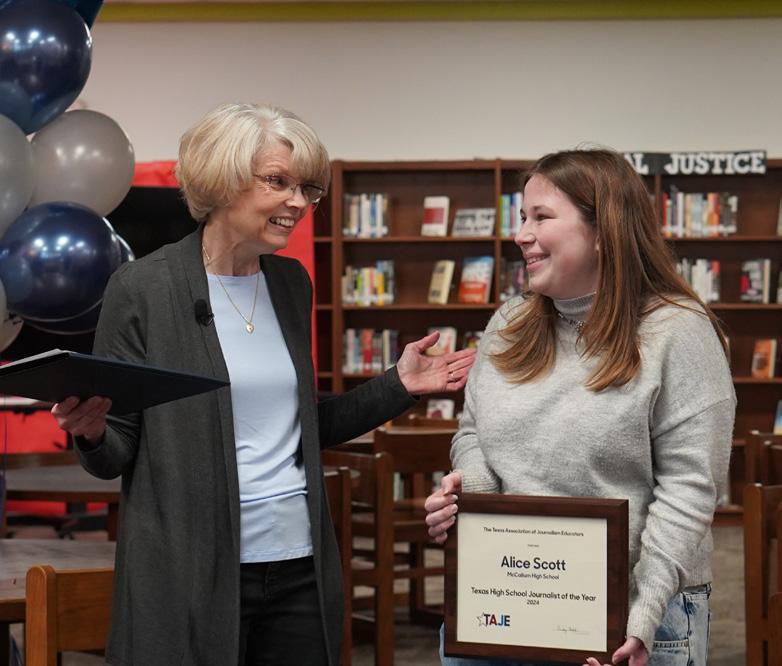
Senior Shield co-editor-in-chief Alice Scott learned that she has been named Texas High School Journalist of the Year on Feb. 29. Texas Association of Journalism Educators executive director Cindy Todd delivered the good news at a surprise party thrown in Scott’s honor in the library during her eighth-period newspaper class.
Scott received the award after submitting a portfolio outlining her seven years of journalistic experience. The ILPC judging panel, made up of both former and current journalism educators, analyzed applicants’ portfolios based on a rubric established by the Journalism Education Association that focuses on 11 categories, including leadership, writing, reporting and visual communication skills. According to
The McCallum Youth Dance Company officially opened its brand new dance building on Feb. 27. The building consists of two studios downstairs, two locker rooms upstairs, an office for the co-directors and many other new amenities for the dance program. Co-director Natalie Uehara is extremely excited about the new building.
“The building was in the works long before I started working at the school,” Uehara said. “They advocated for it in a bond in 2015 which didn’t pass, but it finally passed in the 2017 bond.”
Dance boosters argued successfully that the new studio should be part of the 2017 bond because the black box theater was too small to accommodate the number of dancers in the program. Construction workers broke ground on the building in the summer of 2022.
“We will be able to easily replicate the size of stages we perform on,” Uehara said. “It’s more than a dance space; it’s a home.”
Co-director Terrance Carson is a McCallum dance major alum who is also excited for the new space.
“We’ve wanted higher quality dance facilities for a long time now,” Carson said. “Having the new dance space will definitely open up more creativity for all dancers in the space.”
Since Carson was a student at Mac, he has a unique perspectives on the dance building.
“I made so many memories as a student in the black box,” he said, “so I am very excited for students to make even more in the new space.”

Todd, the judges concluded that Alice had “excelled” in all 11 categories after evaluating her “impressive” portfolio.
Under the assumption that the Shield staff would be working on fundraiser posters in the library, Scott was surprised to find a celebration waiting for her. Surrounded by her family, friends, teachers, administrators, AISD trustees, fellow Shield staff members and a KXAN news team, she was provided with an award plaque and flowers to commemorate her accomplishment.
Scott will represent Texas at the Spring JEA/NSPA National High School Journalism Convention from April 4-6 in Kansas City, Mo. She will also be presented with a $1,500 scholarship at the ILPC Spring Convention April 21 at the University of Texas. —Morgan Eye
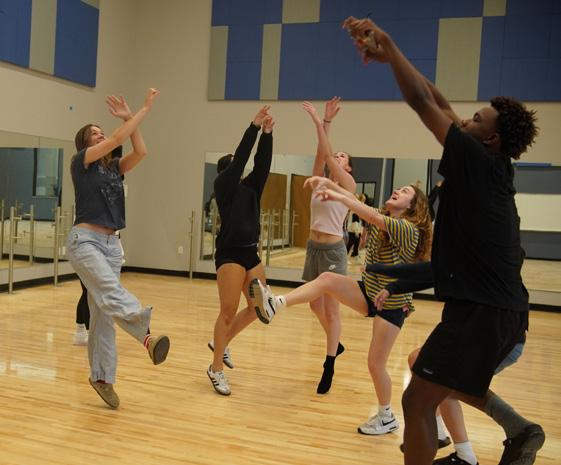

March 28
AISD Board voting meeting
April 4
AISD Board of Trustees information session
April 15
Senior class panoramic photo during FIT
April 16
April

Senior Miles Richardson received a surprise visit from college counselor Camille Nix and principal Andy Baxa during class on Feb. 13, in which the two congratulated Richardson for his recognition as a National Merit Finalist.
Richardson remarked on his initial shock to the principal congratulating him.
“‘Wow, Mr. Baxa is embarrassing me in front of my whole class!’” Richardson said. “But it was nice, they brought me balloons and a cupcake, so it was fun.”
Richardson was the sole McCallum recipient of the
National Merit finalist award this year.
“I had hoped I would get it,” he said. “But it’s kind of sad, I hope there’s more in the future.”
Richardson was one of 15,000 National Merit Finalists students across the country recognized for having nationally outstanding PSAT and SAT scores. According to the National Merit Scholarship Corporation website, finalists are eligible to compete for more than 7,100 National Merit Scholarships worth nearly $28 million. NMSC will release corporate-sponsored scholarship winners in April, National Merit Scholarship winners in May and college-sponsored scholarship winners in June.
—Camilla VandegriftThe McCallum administration recently enacted a new bathroom policy aimed at prevent students from spending too much time in the hallways and missing classroom instruction. The policy was made to reduce hallway traffic and to keep students from using bathroom passes to skip class thus preventing others from using the restroom.
The new policy requires students to fill out a Google form to sign out of class in order to use the restroom. The form records a student’s email, teacher and class period, and is available to be scanned via QR codes that have been set up throughout classrooms on campus.
The policy also includes a rule that students leave their phones and Airpods in the classroom while they are out of class to use the restroom. The data collected in the form then populates a spreadsheet, which the administration will use to track “frequent flier” students who are using bathroom passes to miss class.
Assistant Principal Larry Featherstone explained the purpose of the new policy.
“[The new policy] is to make sure that things are fair and equitable,” Featherstone said.
He explained previous issues about hall passes.
“A small percentage of students are meeting friends in the hallway,” Featherstone said. “The bathroom policy is making sure that [students] actually have a purpose of being in the hallway.”
Featherstone said the new policy isn’t intended as a punishment for the general student population. “We want them to be able to go,” Featherstone said. “We don’t want them to be able to take advantage [of the hall pass].”
—Josie MullanOn Jan. 27, Class of 2022 graduate Anya Nagle published her debut novel, a young adult fiction story following a teen musician named Stars as he becomes the frontman for one of America’s new favorite indie rock bands, Mothic Wreckage.
“He’s like a living ghost,” Nagle said. “He doesn’t talk to people or about himself, which makes him a frustrating narrator.”
Nagle began writing Mothic Wreckage the summer after graduation, but she said the bones of the story formed at McCallum. Whether in a Writing Center shift, a theater rehearsal or the library, Nagle was writing.
“I definitely formed some of the ideas once I started going to all the concerts in my senior year,” Nagle said. “I was always friends with the music kids, and I was like, ‘I’ve never written about music before, so that would be kind of new to go into this niche and see if it works for me,’ and I think it stuck.”
For two years, Nagle focused on developing a world where Stars could shine. She brainstormed through playlists and Pinterest boards then sat down to write with her cat by her side. In a few months, she had a draft.
“When I get an idea, I’m struck with a feeling or an image, and I sort of ruminate on it for a little bit,” Nagle said. “I let it try and tell me what it means. Once I do that and I outline, then the writing starts.”
Nagle has written plays for Austin-based

chronic project starter: I pick something up, and I ditch it halfway through, but that wasn’t happening for some reason,” Nagle said. “I was like, ‘There could be something here, and I feel like this is a very important story to tell.’”

Nagle said the writing process was simultaneously terrifying and enlightening.
“It was very scary to confront all these different parts of myself that I had not seen before,” Nagle said. “But it was also really freeing and gratifying. In writing this and learning about these characters, I learned more about me and the world I live in.”
English teacher Amy Smith said Nagle was always loyal to her creative writing, despite the confines of high school schedules.
“Anya is a very creative mind and loved to write, even when she was supposed to be doing an essay,” Smith said. “It doesn’t surprise me that she’s already written a novel because she was ready to start writing.”
According to Smith, getting published at 19 is almost unheard of, but Nagle beat the odds.
“To get published at any age is a feat in and of itself,” Smith said. “But Anya was 19 years old when she wrote this book and got it published. That’s a unicorn.”
Nagle queried agents all over the world, attracting representatives for people as prolific as Colleen Hoover, but she ultimately decided to publish independently, working with an editor at Bloomsbury Press in London.
“My editor helped me realize a lot of things about the story,” Nagle said. “Originally, it was a very sad story. She was like, ‘Have you ever considered giving it a happy ending?’
The more I thought about it, the more I was like, ‘Yeah, I think I think my editor is right. It needs a happy ending.’ And so I changed it.”
When Nagle finished her final draft, she burst into tears in the middle of a library.
“I was happy to be done, but it’s like a breakup,” Nagle said. “I was like, ‘It’s over. There’s no more.’ That period of time, where all I felt was that rush of relief, was insane.”
When she saw Mothic Wreckage on the “New & Noteworthy” table at Book People, Nagle finally understood that her lifelong dream had been accomplished.
“The first time I went, I got so nauseous,” Nagle said. “I was like, ‘This is not real. This is like a dream.’ This is all I’ve wanted since I was little, so it’s really exciting. I go to Book People quite often just to stare at it.”
On Feb. 8, Nagle hosted a release party for her novel where she sold autographed copies and an assortment of merchandise.
“It was beautiful to watch my community consolidate into one group, so I could thank them at the same time,” Nagle said.
Class of 2023 graduate Layn Mayfield, a longtime friend of Nagle’s, was one of the first to read Mothic Wreckage
Due to Nagle’s strong descriptive writing and thought-out characters, Mothic Wreckage exceeded Mayfield’s expectations. Nagle’s ability to write “casually queer” characters
stood out to them as they read.
“The way that she writes queer characters is the way that most people write straight characters where it’s just normal,” Mayfield said. “You don’t have to make a point of saying they’re straight. It’s just they are what they are.”
Mayfield said Nagle’s journey as a writer inspired them as a fellow teen.
“I heard she was getting published, and I was like ‘That’s amazing,’” Mayfield said. “I didn’t know that was something that a 19 year old could do. I’m realizing that I can be doing things like that.”
For Nagle, writing is all about giving a voice to young people.
“Other people my age are looking for some sort of escapism in their literature, and if I can provide that, that’s awesome,” Nagle said. “I think the first step to that is writing things that young people will relate to.”
Nagle said she is working on a prequel, and a web series is being discussed. But in the meantime, she hopes readers can focus on the core message of Mothic Wreckage.
“If there’s one thing I want my readers to take away from Mothic Wreckage it’s that what we are able to build with other people is so crucial,” Nagle said. “We should really be paying more attention to telling people we love them and forming bonds—leaving love behind where we stood.”



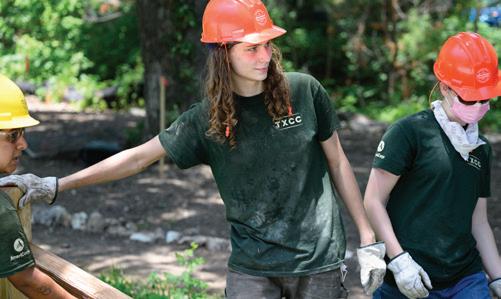




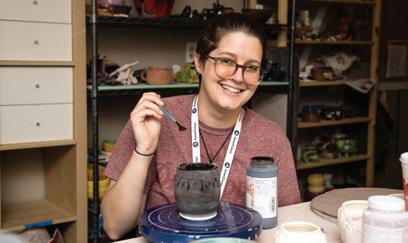








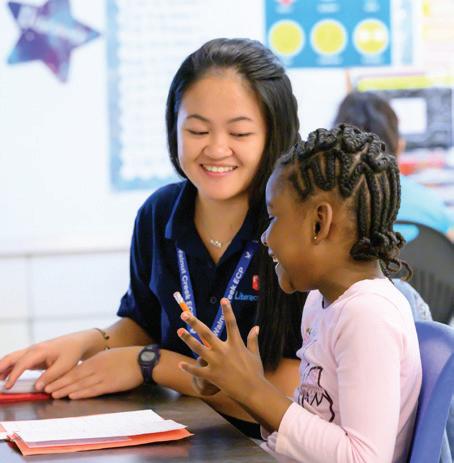




Targeted towards 5 to 7 year olds, Bluey has been able to captivate my 17-year-old heart. Bluey is an Australian animated TV show that follows the life of 6-year-old Bluey, an Australian blue heeler. It premiered on Oct. 1, 2018, but was released in the United States on Sept. 9, 2019 on the Disney Channel and Disney+.
Across the show’s episodes, Bluey learns about the issues that every kid faces, but the show also demonstrates the struggles that parents go through when raising their children. This dual appeal, along with lovable characters and bittersweet episodes, has led to the Bluey community expanding beyond just young kids.
I first saw Bluey on a YouTube thumbnail that showcased an iceberg about the show, and it piqued my interest in the character. I got to know about the origins of the Bluey show, theories about why certain characters act the way they do, facts about the characters and much more. It made me want to give the show a try, so I watched the first episode called “The Magic Xylophone” on Disney+ and from there I fell in love with the show. From the adorable sister bond of Bluey and Bingo to Bandit’s dad’s attitude around his daughters, to the simple background music, the show brought me back to days when I was a sweet, innocent child. Bluey is the type of show that I wish I could have watched when I was growing up.
Despite being the main character, Bluey isn’t the only one who shines. Bluey’s 4-year-old sister, Bingo, is determined, curious about the world around her and absolutely adorable. Bingo also reminds me a lot of my youngest sister, Vanessa, because like her, Bingo loves to have a good time. Their parents, Chili and Bandit, could not be more perfect cartoon parents. Bandit always finds ways to make his family laugh but makes sure he incorporates lessons for them to learn from. Chili is a very sweet and understanding mother who likes to make sure her daughters have everything they need.
Bluey is filled with adorable and different characters, so it can be hard to pick a favorite.
One of the best characters is Bluey because she is so silly, has an open mind when things go wrong and always steps up to be a leader for everyone. But the character who is absolutely amazing is Muffin Cupcake

Heeler, Bluey and Bingo’s 3-year-old cousin. Other than being extremely cute, any time that Muffin comes on screen you know that chaos is about to ensue. In the episode “Sleepover,” Muffin is the funniest character, and because of that it has become one of my favorite episodes.
“ There is something so satisfying about ‘Bluey’ episodes, and I think that’s because of the problems presented.
”
In the episode, Bluey and Bingo want to stay up late, but Muffin is already sleepy and moody.
Muffin is in a drowsy state of mind causing her to say ridiculous lines like “Coconuts have water in them,”
and she even goes as far as riding a flamingo and declaring herself the “flamingo queen.” “Granny Mobile” is another favorite of mine because of Muffin’s Grouchy Granny attitude as she bosses others around, but of course it’s all fun and games. The most memorable moment occurs when Muffin is able to gather enough money for a vacation trip at a garage sale, even going as far as selling a mobile for $1,200 to another Grouchy Granny. Her attitude in this episode is absolutely hilarious and funny to watch.
There is something so satisfying about Bluey episodes, and I think that has to do with the problems that get presented. The problems that Bluey, Bingo and their friends run into are problems that any kid can run into, like having playtime differences with your friends, wanting to stay up late or
wanting your parents to play more often with you. One of the episodes that teaches kids about not giving up even if the challenge is tough is “Bike.” In this episode, Bluey decides to stop trying to learn how to ride her bike at the park.
After she quits, she and her dad, Bandit, observe her cousin Muffin struggling to put her backpack on and Bingo unable to reach the water fountain to take a drink. After multiple attempts, they both give up like Bluey, but they try alternate tactics, and in the end they succeed. This convinces Bluey to give her bike lessons another try.
Because Bluey has become one of my favorite shows, I wanted to hear other people’s opinions about the show here at school. Though a few people thought I was too old to watch something like Bluey, I am still happy to report that I found people in the Mac community who share my love for Bluey and the characters.
Science teacher Sarah Noack doesn’t just love Bluey because her kids do, but she also appreciates how realistic the show can be.
“There are a lot of shows that teach lessons, but that is all they are doing,” Noack said. “I like Bluey because it is super real life and it looks the way that my house does and sounds [like my house too], and it teaches amazing lessons.”
She is also grateful that the show has made her realize that moments spent with her kids are important to create long-lasting memories.
“Time is fleeting, and I need to play with my kids just as much as I need to cook dinner and do the laundry and all those things,” Noack said. “It’s important that I [am] building memories, and the show reminds me of that a lot.”
Science teacher Kristen Cerame first heard of Bluey from Noack, and she and her daughter’s love for the show developed because of how humorous the show is.
“It’s a fun show, and there is a lot of humor and empathy,” Cerame said. “[My daughter]is an empathetic person, so she understands the interaction with the kids and loves the characters.”
When asked about her favorite character, Cerame said Bingo with no hesitation.
“I mean who doesn’t love Bingo,” Cerame said. “That is my daughter’s favorite too, and it’s hard to say because they are all awesome and fun. Muffin is definitely the diva of the group.”
I know that I will more than likely receive critcism for being a Bluey fanatic, but I do not mind one bit. Bluey is a hilarious and amazing show that I watch whether I want a good laugh or a reminder to dust myself off after a rough day. Even though we are high school students, we should feel no shame even if we aren’t the primary audience.

meeting daily to perfect music, blocking and choreography.
Throughout February, the Blue Brigade competed in three regional dance contests, performing dances they have been preparing since the conclusion of football season. On Feb. 3, Blue Brigade competed in MA Regionals at Hays High School, winning many officer, ensemble and team awards. Solos and duets competed at the American Dance contest on Feb. 17, and the Blue Brigade traveled to Dripping Springs High School to compete in the Crowd Pleasers Dance Competition on Feb. 24.
The Blue Brigade won many awards at Crowd Pleasers, the final competition of the season. The team won overall grand champion for the classic division, which came with a medal but also $300 to put towards future competitions through Crowd Pleasers Dance Competitions. Other awards included first runner-up high platinum for the officer contemporary number, first place high platinum in officer jazz and officer lyrical, as well as officer grand champion for the large classic division. The officers

The show opens in less than a month and will run for two weekends from April 4-7 and April 11-14.
Beyond MacTheatre’s mainstage performances, students have also taken to organizing new program events. On March 6, students came together to perform the first ever theatre cabaret, New Beginnings. The event was organized by junior Royal Court Player representative Eric Judge and showcased student work in the form of monologues, duet scenes and songs.
Outside of school, several student performers joined dance director Natalie Uehara on a trip to London to learn more about theatre. The trip included a visit to The Globe Theater, which is famous for putting on many of William Shakespeare’s classic plays, and the opportunity to see many professional West End productions.
On Monday , students in the musical theater class attended a masterclass with Marina Lazaretto, a member of the National Broadway Tour of Wicked that is currently in Austin, where students learned choreography to the show’s popular number “What is this Feeling?” known among cast members simply as “Loathing.”
—Alice Scottalso earned second runner-up grand champion, which pitted the group against all teams regardless of size. As a team, the Blue Brigade won first place for its contemporary and pom numbers and first runner-up for its jazz and hip hop performances. In the team pom category, the dancers were also honored with the High Point Award for the classic division. Co-captain Kylie Reeves has been on the team for four years and has committed lots of time and energy into it. “I’m feeling very sad and nostalgic for it being my last competition,” Reeves said. “I loved performing all of the dances, especially the small ensembles.” Reeves and the rest of the team had to put lots of time and effort into preparing for the long day. They had many early mornings and weekend rehearsals where they ran, cleaned and worked on all of the dances. In addition to team rehearsals, the dancers also had to put in individual work to practice dances on their own time.
April 2
Pre-UIL String Orchestra concert in FABT @ 7 p.m.
April 11-12
UIL String Orchestra Concert @ the PAC
April 26
Blue Brigade Spring Show in the MAC @ 7 p.m.
April 27
Blue Brigade Spring Show in the MAC @ 7 p.m.

Scan the QR Code or visit macshield online.com to view our Tuesday Top 10 photo gallery about MacTheatre’s multiple spring events.
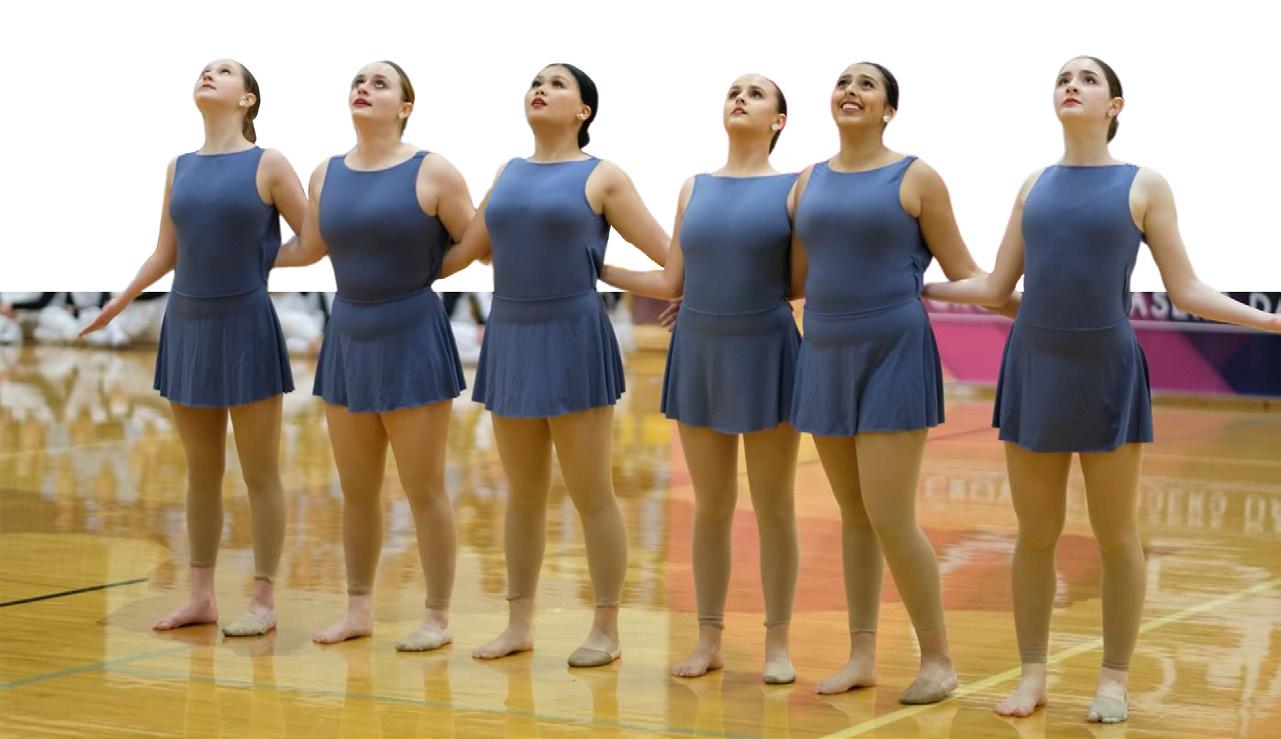
Thirteen Mac Dance students traveled to Beaverton, Ore., Feb. 1518 to participate in the Regional High School Dance Festival.
“The trip is basically an opportunity for dancers interested in pursuing dance after high school,” junior Zoe Maxwell said. “There are opportunities to receive scholarships, as well as master classes from professors around the nation.”
The dancers left Thursday, Feb. 15, ahead of the three-day event. At the festival, students had the opportunity to take classes on all styles of dance, watch performances and compete for scholarships.
“It allowed students to learn and reach out to colleges as well as meet other dancers in the small dance community,” Maxwell said. Five students received scholarship offers and special recognitions at the festival, including juniors Analise Bady for The American Musical
and Dramatic Academy (AMDA) and Dean College, Eli Lopez for Colorado State University, Julia Rasp for Dean College, Zalie Mann for AMDA, Colorado State University and Dean College, and Maxwell for Colorado State University.
The dancers also had the opportunity to perform STARS choreographed by dance teacher Terrance Carson at one of the festival’s showcases and reunite with former McCallum dance teacher Rachel Murray. But for Maxwell, the most rewarding part of the trip was getting to spend more time with her peers.
“[My favorite part was] probably the bonding experience I got with all of my dance friends,” Maxwell said. “I feel like we got a lot closer, and it was just a great friend experience.”
—Alice ScottWhile founding an organization comes with hurdles, sophomore class president Ruhi Motwani didn’t shy away from the task. With her experience in student government and summer participation in a Barnard College entrepreneurship intensive, she felt prepared to start the You Can Be a Leader Club.
“I learned a lot of valuable information in those three weeks [at Barnard], and I wanted to bring back some of it to McCallum students.” Motwani said.
Motwani’s hope for the club was to bring the lessons she learned to her community, and inspire anyone to be a leader.
“I think that a lot of people have this preconceived notion that not everyone is meant or made to be a leader, but I believe the opposite,” Motwani said. “Anyone and everyone can be a leader.”
Motwani reached out to senior Olivia Hexsel for help with the launch of the club, hoping she could ensure that the organization succeed from the start.
Given Hexsel’s role as student body president and her officer role in several other clubs, Motwani thought she would be a valuable partner in the launching the club.
“I knew I
wanted to ask Olivia to be the vice president because she has a lot of experience with leadership and would be a great addition to the club,” Motwani said.
Hexsel, meanwhile saw the club as a way for her to make a difference but also to grow as a leader herself.
“I thought it would be an amazing opportunity to voice my opinion about what qualities a leader should hold,”
Hexsel said “The club’s goal isn’t just showing how to be a leader but also demonstrating and doing interactive activities that include showing how our members can become leaders.”
community with their leadership skills,” Hexsel said.
Members have enjoyed the unique opportunities offered by the club.
“ Leadership is a vital skill that everyone needs to employ within their lives.
—sophomore and You Can be a Leader Club founder Ruhi Motwani
Hexsel and Motwani’s hope for the group was to create a cohesive club that would help the McCallum community
“We wanted a very informal, fun and engaging setting through discussions and games that gives the students an opportunity to learn about leadership and how to find their most effective approach,” Motwani said.
In the You Can be a Leader Club, Hexsel and Motwani take a different approach than other clubs.
“Our club focuses more on each individual and how they can improve and better their
“I enjoy coming to this club because it is a fun environment that me and some of my friends can come to and learn about leadership skills,” said sophomore Rylie Ruppersburg. “I love that leaders are brought to some club meetings to talk to us. I like that the club gives me a chance to hear from people with tons of experience in the real world.”
Hexsel hopes that students join not just to be in the club but to focus on what they can bring to the table.
“We want people to join to help them be a leader,” Hexsel said.
Motwani believes that the biggest part of her club is reaching out to all different kinds of people.
“Leadership is a vital skill that everyone needs to employ within their lives, and I believe that it is a very important skill students begin to work on from a young age,” Motwani said.
Motwani didn’t just want to provide members in her club with wisdom but experiences from the community as well. So Motwani decided to bring in several different guest speakers, with a variety of different experiences throughout the club’s time.
“Bringing in several speakers allows us to hear different stories and lessons they have learned and different view points to help understand all aspects of being a leader,” Motwani said.
One of the first guest speakers Motwani invited or this school year was Dr. Rosa Pena who has 32 years of public service experience with Austin ISD.
“Dr. Pena became the director of leadership programs, secured grant funding, led professional learning opportunities for campus leaders and collaborated with university preparation programs,” Motwani said. “I have previously worked with Dr. Pena, and she is someone that I look up to. The club is predominantly female, so it’s nice to show them real world representation within society.”
Since Dr. Pena’s visit in October, Motwani has invited many more speakers, including CEOs, a Travis County judge and a Tedx speaker.
“I want to be able to provide members with their wisdom and guidance so they can apply it to their community and school and be the best leader they can be,” Motwani said.

4,500 miles, 70 days and over a year of training.
When Carolina Arellano heard about the opportunity to bike ride from her hometown of Austin to Anchorage, Alaska, to raise money for cancer and help the research industry, she knew it was too good to pass up.
After graduating from McCallum in 2020, Arellano continued her education at the University of Texas pursuing a degree in international relations and global studies. Going into her junior year of college, however, Arellano found a new path to pursue: Texas 4000, a UT student organization dedicated to furthering cancer research, organizes yearly bike rides to Alaska to advance this mission and support the cancer community nationwide. The ride to Anchorage is currently the longest charity ride in the world.
“I really thought I could do something for that cause,” Arellano said. “It just was something that really resonated with me.”
Considering herself an amateur rider at the time of applying for the program—she only started biking in 2020 as a way to connect with her friends— Arellano believed in the mission so heavily that she was willing to put in the training and effort to be a part of it.
The mission of the project touched Arellano because of her family’s history with cancer and because of her desire to help families in the future who experience the same struggle.
“My grandmother passed away from cancer in 2008,” Arellano said. “And my mom smokes a lot of cigarettes, so I made an agreement with her that once I completed the ride to Alaska she would quit smoking.”
Texas 4000 uses its resources to provide the necessary equipment for its cyclists.
“There are other things like training camps,” Arellano said. “We practice skills like how to drink water while you’re riding your bike, all
things you would not really think you had to know, but you have to know.”
According to Texas 4000 program coordinator Caroline Ferguson, helping riders prepare for the summer ride over a long period ensures a smooth sailing and safe experience.
“Our goal is to create a top-notch model for developing student leaders aiming for national recognition,” Ferguson said. “We continuously strive to increase our impact in the fight against cancer.”
Ferguson’s role within the program allows her to be hands-on with the riders, as well as the operation itself.
“As a program coordinator at Texas 4000, I ensure smooth program operations,” Ferguson said. “I assist riders with ride planning, onboard new riders, plan meetings and presentations and
goes through Vancouver,” Arellano said. “The second one is the Rockies, which goes through Colorado and the Rocky Mountains, and [the last one], The Ozarks, goes through the Cancer Belt.”
While riders don’t get to pick their designated route, they are allowed to detail which they would prefer.
“I indicated I wanted Sierra because I speak Spanish, and there is a huge Spanish-speaking population in California, so I think I’d be a good fit,” Arellano said. “They try to align us to their
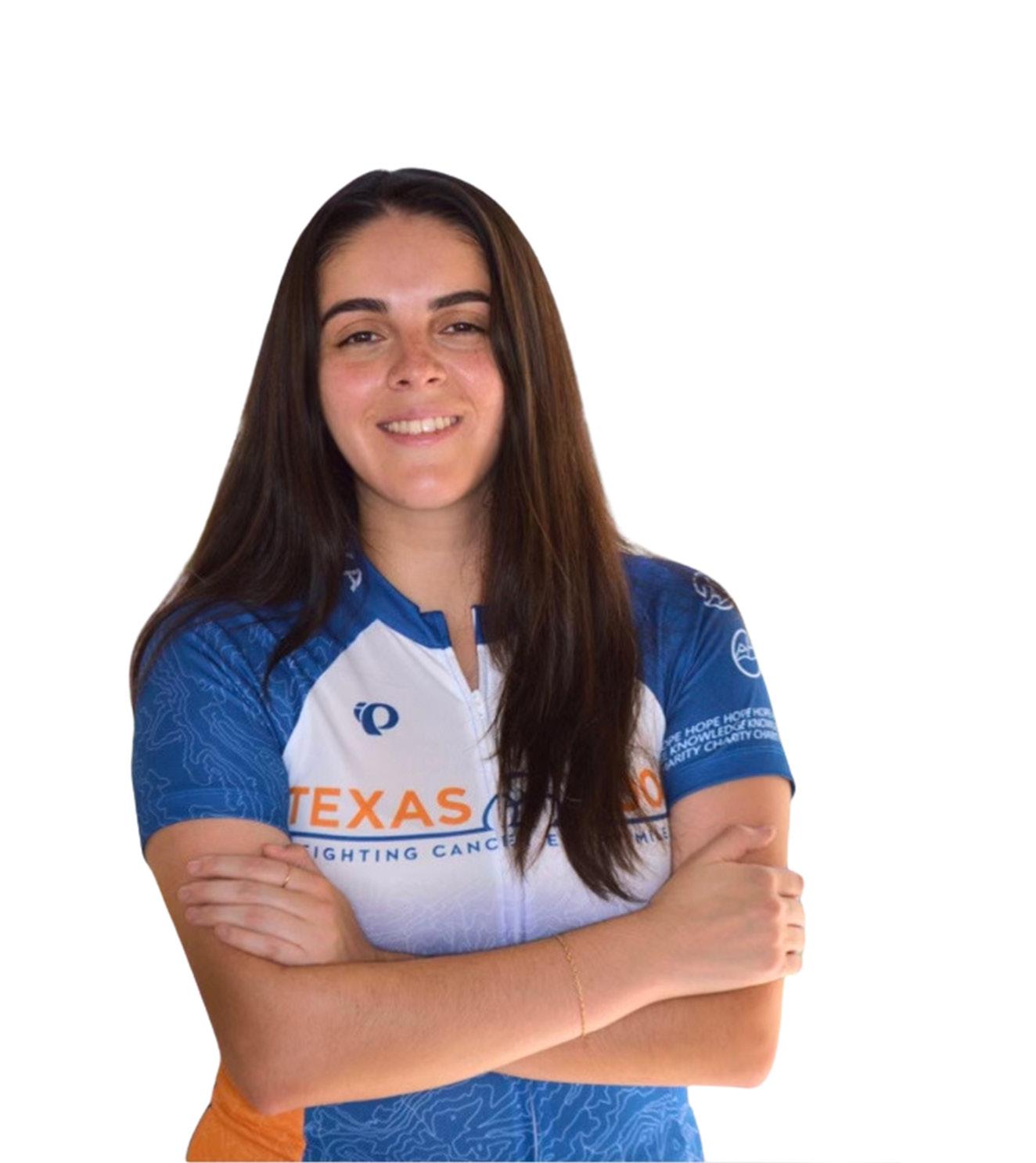
“
her goal is to repeat her feat and inspire others to join in on the cause.
“Texas 4000, I think, is a cool way to promote cancer awareness, so I definitely still want to help,” Arellano said. “But I want to make it bigger because I feel like we’ve been here for so long, but so few people know about it. I want to focus on branching out to the cycling community.”
It just was something that really resonated with me, I really thought I could do something for that cause
—Texas 4000 rider Carolina Arellano
”
The community is a big part of what Arellano has gained from her time with the program, from new friendships to a group of riders who will support her the whole way. Maleni Arredondo, a friend Arellano met through Texas 4000, explained that developing a close relationship with Arellano over their shared passion makes the experience more comfortable.
Donations are a big part of the Texas 4000 mission as well. In the time before the ride and the 18 months a rider is part of the program, they are required to raise $4,500 for the 4,500 miles ridden. The money provides both funding for the journey and supports
“Texas 4000 continues to grant and support cancer research—such as Dell [Medical
“It’s been a wonderful experience to get to know and support each other through our journey in Texas 4000,” Arredondo said. “Whether it’s pushing each other during training rides, enjoying a post-ride meal or supporting one another in our fundraising efforts, our friendship has really flourished into a special one—one that I didn’t know I could gain from this experience.”

With still a long way left in her journey, and the ride itself upcoming, Arellano thinks back to her grandma for inspiration. She was the original reason for Arellano’s commitment to advocacy and spreading her message to others.
“Having my grandmother and a couple of other family members being affected by cancer really did motivate me to pursue this organization” Arellano said. “It’s taught me how vulnerable we can be with each other and how honest we can be and even how accepting we can be of each other and our differences.”
The journey, in Arellano’s eyes, will bring her closer to something she’s passionate about. It will allow her to impact others’ lives in a unique way, one she would’ve never dreamed of.
Arellano said.


Julia Copas staff reporter
On Nov. 8, 2022, Travis County voters passed a $2.4 billion bond package for Austin ISD, the largest school bond package to pass in Central Texas. McCallum was not on the first draft on the ballot but was added after the district heeded community feedback and allocated $66.55 million to modernize the Mac campus.
The bond budgeted $8 million for athletic field upgrades, technology and furniture, $22.9 million for soft costs and other costs, including surveying fees, materials testing, permitting and inspections. The rest, $35.59 million is for project construction.
McCallum is set to receive a phased modernization, meaning that instead of being fully demolished and rebuilt within one bond cycle, it will take three or even four phases to be completed.
In theory, this means that McCallum is due to receive funds for the next phases every bond cycle, which occurs approximately every five years. Phase two then should be approved in late 2027 and finish around 2031. Then, phase three
should be approved in late 2032 and completed in 2036. And finally, phase four should be approved in late 2037 and completed in 2041.
Bond implementation supervisor Jorge Ledesma says that this timeline won’t work.
“That’s like 15 years from now,” Ledesma said. “It’s like, ‘So I’m gonna get a new school in 20 years?’ McCallum really needs to get phase two and three and maybe even four in one shot.”
For now, the focus is mainly on making repairs and improvements that can keep the campus afloat until the next phase of the bond is approved, which will involve demolishing and then replacing the majority of the school.
The Campus Architecture Team, or CAT, a group of community members and AISD parents who are providing input on McCallum’s renovation, has expressed concerns about this allocation because a majority of the funds from the construction portion of the bond were slated to be used for facility improvements for a building that is set to be entirely demolished within the next couple years. In a meeting on Feb. 12, the CAT was given a new maintenance improvement scope, which reduced the costs of replacing roofing, A/C, ductwork and piping



from $36 million to $11.5 million. The money that was gained back from reducing improvement costs was put back into construction, and now the construction budget has been adjusted so that more money can be spent on the two main components of phase one: a secure entry vestibule and an academic addition.
“
Out of 130 maybe 70 redone. And AISD has kind slip a little
The secure entry vestibule will go where the front office is now located. It will rearrange the way the office is laid out, flipping the counselor and reception area so there is a clearer view of the front entrance of the school. It will also create a two-door entry system so that visitors are required to check in at the front office in order to enter the building. It will also close in the space adjacent to the office by the side entrance to the cafeteria and create a new meeting space.
- Bond implementation supervisor Jorge
Renovation










130 campuses, need to be And in the past kind of let that little bit
Jorge Ledesma
A significant part of the 2022 bond is a new academic building that will replace the existing science hallway. The new building will be approximately 50,000 square feet across three stories and will contain 12 science labs, four CTE labs, four studios (smaller classrooms), three professional learning centers (shared teacher offices) and three collaborative spaces. The collaborative spaces will be part of the main hallway, which will be about 27 feet wide. After the academic building is finished, the existing science hallway will be demolished.
”said. “I don’t ever envision McCallum will leave the campus. At worst, we bring in a bunch of portables and we would create another portable city somewhere and house whatever we’re losing in the portables.”
Ledesma says that McCallum renovations have been put off for so long because it’s hard to be a funding priority in such a large district.
“We have approximately 130 campuses, and out of those 130, maybe 70 need to be redone,” Ledesma said. “And in the past AISD has kind of let that slip a little bit, so now we’re kind of swimming against the current.”
Baxa says it’s because there has been less community output.
maintenance upgrades, and Bowie (built 1988) received $91 million for Phase 1 of a full modernization and a new parking garage.
In 2013, McCallum received $20 million for mainly a new weight room facility and general upgrades and repairs. Anderson received $24.9 million for a new gym, locker and weight rooms, track resurfacing, and other general repairs. Bowie received $34 million for a pastry shop, media lab, technology studio, updated training room and food lab, as well as new practice fields, expanded locker and weight rooms and track resurfacing.
is community involvement, especially in the voting process.
“If we were to go step by step and in the 2027 bond McCallum gets voted for phase two, we still have to put [that to] a vote. So you’re not gonna get anything if people don’t vote for it,” Ledesma said.
Baxa feels that continual support is crucial in order for McCallum to meet the needs of future students and for each phase to build upon the previous one.
“There’s just too many unknowns,” Baxa implementation
“The best I can point to [for McCallum being put off for so long] is the fact that our community doesn’t speak up,” Baxa said. “You’ve got to show up to meetings, you got to make your voice heard. Anderson and Bowie parents did that a lot more than we did, and so they got taken care of.”
Principal Andy Baxa said that the plan for all phases is to keep students on campus and avoid having to move elsewhere during construction.

In the 2017 bond, McCallum received $8 million for a new dance addition, which is in the final stages of construction. Anderson (built in 1973) received $11 million for general

“But that’s also why the 2022 bond program had such a radical shift in direction is because they saw some of the things that they viewed as being inequitable, where certain communities got more than other communities whenever they didn’t really need more than the other communities,” Baxa said. “I can’t say that Anderson needs everything that they’ve gotten. They’re at a much better position than a lot of other schools, but they have the vocal community that gets the support.”
Both Ledesma and Baxa agree that the key to getting McCallum to where it needs to be

“If it doesn’t pass, I’ve always told [the bond committee] that we’ve got to be at net zero,” Baxa said. “I can’t have a negative situation here because just in case a situation happens where we don’t get the next bond, we at least have classroom and lab spaces to accommodate the needs for what we lost. And we can make it work for a couple of years if we have to. But there’s never been a bond package with AISD that hasn’t passed at least somewhat. Now there have been parts of it that didn’t pass, but there’s always been at least something that got passed. So we’ll just have to wait and see what direction the bond committee takes us in ‘27.”

2008
Bujacz starts at McCallum.
2016
Bujacz leaves to start family.
2019 Bujacz returns to Mac to fill teaching place.
2020 Bujacz teaches online for AISD.
2024
Bujacz
‘There’s no
When at a dinner party in her mid-20s, Amy Bujacz was asked: What would you be doing if money didn’t matter?
“I would still be a teacher,” Bujacz said. “When people heard that, they asked me ‘There’s really nothing else?’ I love teaching. It’s my favorite thing to do. There’s no other job I’d like to do instead of it.”
While her journey with teaching has been long, Bujacz has finally landed back at Mac. After science teacher Jace Klein’s departure at the end of last semester, Bujacz has returned to the school where she once taught for eight years to replace Klein in the science department.
Bujacz was born in a small town just outside of Ottawa, Ontario, Canada, and came to the University of Texas at Austin on an athletic scholarship for rowing. After getting into a car crash that didn’t allow her to row anymore, Bujacz turned all her focus into her pre-med studies. But after she got a C in chemistry,
“I went home and my dad was like ‘Do you want to make $250 today?’ Bujacz said. “He walked me to a classroom and said, ‘This is Ms. Bujacz, and she’s going to be your teacher today.’ He gave me sub plans and shoved me into the classroom and left. I had a really good time, and I started subbing after that. I was like, ‘This is what I want to do.’”
Bujacz then graduated from the UTeach program and started at McCallum in 2008.
“Because I was an immigrant and was on a work visa with AISD, I had a guaranteed job,” Bujacz said. “I went and interviewed at Travis, but it was far south. So I came to McCallum, and it was closer to where I lived. I was very happy that I landed at McCallum.”
After two years at the job, some students came to her interested in AP Biology, which at the time wasn’t offered at McCallum. Bujacz remembered her AP Biology teacher from high school—Mr. Martin—and how much he impacted her life, which inspired her to try to bring the same experience to students of her own.
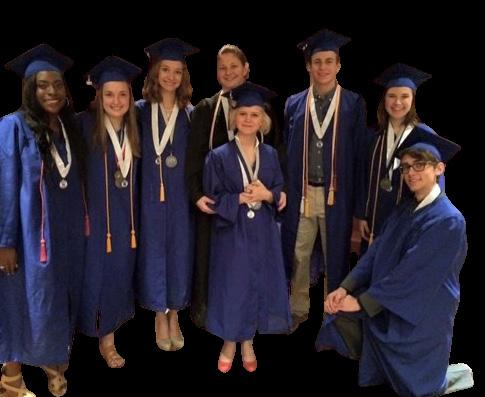
“Mr. Martin was this extraordinary science teacher who had us do all these cool labs, and he was super engaging,” Bujacz said. “I was super into science and that’s why I was a biology major. I want to be that teacher.”
From there, Bujacz went to Gabe Reyes, the assistant principal at the time, who told her that she had to get 24 names of kids who wanted to take the class to get it added to the class option list. When enough students had signed up, McCallum began offering AP Biology again in 2011—all thanks to Bujacz.
Bujacz taught AP Bio until she left in the spring of 2016 to focus on her family and take a break from teaching.
“Being a stayat-home mom is hard, especially when you’re super social and outgoing, like me,” Bujacz said.
“That’s why I teach high
school, for the social aspect. I get to teach them but also interact with them. But we decided that as a family we didn’t need that money that would come from teaching and have to deal with all the sicknesses and time off of work. It was really sad leaving but after having a kid, my priorities changed.”
Bujacz decided to return in December 2019 to fill the role of the aquatic science teacher who had recently left, a position similar to the one she accepted this year.
“They were going to [reschedule] 178 kids who signed up for [aquatic science] and eliminate the class,” Bujacz said. “I didn’t want to do that to the kids, but I knew nothing about the ocean, fish tanks or fish. Teaching that class terrified me, but I ended up learning a lot, and it was cool. I still had one or two sections of AP Bio that I taught by myself.”
Bujacz planned to reevaluate whether she would stay at the end of the year, but then COVID hit, so she moved online with the kids and taught them until the end of 2020. For the next two years, on and off, she taught online for various AISD schools. When science department head Nicole Sorto, whom Bujacz has known since teaching at McCallum in 2008, asked if Bujacz wanted to come back to fill Klein’s spot, Bujacz knew immediately that she wanted to take it. The offer took her back to her AP Biology roots.
“That’s part of the reason that I took the job, when they don’t have a permanent sub or there’s a new person every day, the learning stops,” Bujacz said, “so it’s nice to be a consistent teacher for the rest of the year.”
Before coming in, Bujacz heard a lot about how McCallum had changed and evolved since her time teaching. But when she stepped foot in the school again, she realized that though some things had changed, the reason why she loves teaching at McCallum had not.
“They had me worried that it was going to be this whole new group of teenagers I didn’t know, and you guys are still just teenagers, which I love,” Bujacz said. “I mean some things have changed, but I love the inclusivity, I love the creativity and all the kids. There’s no place like it.”

By reading the daily announcements, student council seniors build bonds while providing McCallum with latest news, essential updates and really bad jokesEvelyn Jenkins staff reporter
Behind the voices of the announcements that come over the PA system each morning, there is a tight-knight crew of Knights. Over their time on the intercom, seniors Madi Briggs, Hannah Herrera, Olivia Hexsel and Jay Schlett have grown closer together and provide McCallum with daily updates, news and jokes.
The crew began working together when they became student council members their freshman year.
“I joined the student council because I wanted to be more involved with the school,” Briggs said. “I wanted the opportunity to be a leader and share my leadership skills with the community.”
This year, these students took on the role of delivering the morning announcements to provide students and staff with information about the upcoming day.
“As a part of the student council, it’s always been a tradition for the student body president and vice president and the senior class officers to do the announcements, so we took on that role,” Hexsel said.
They put the announcements together with the help of student council sponsor Amy Brodbeck. Brodbeck writes the announcements and the students choose the order in which to read all of the information. Teachers are also able to fill out Google forms so that their messages can be read over the announcements.
Brodbeck became the student council sponsor two years ago after the previous sponsor left McCallum. She volunteered to take the role due to her own student council experience when she was in high school.
“I was in the student council when I was in high school,” Brodbeck said. “I didn’t play a major role in it, I was just a member, but I decided that I wanted to help out with the student body. [The sponsor role] was open, and I stepped up and decided to do it.”
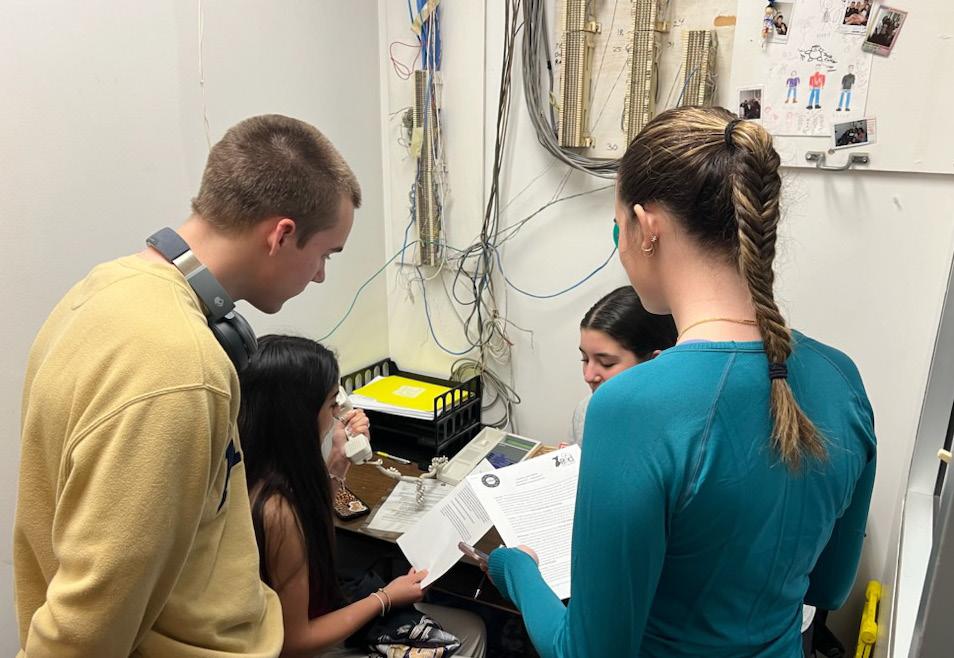
athletics and other classes,” Brodbeck said. “I think it would be cool if everyone saw their student leaders giving the announcements every day.”
The morning announcements are memorable to McCallum because of the beginning snippet of music and ending “Bad Joke of the Day” they hear over the intercom every day. When the crew doesn’t have any ideas for songs to broadcast, they turn to a playlist that they use to help pick a song of the day.
“ I think doing the announcements has helped me be more confident in who I am.
—senior Olivia Hexsel
”
In the future, Brodbeck has plans to present the announcements in a video format and broadcast them during advisory.
“I know not all the announcements get heard and that some kids are too busy in
“Usually we just pick a song that has been stuck in our head or a song that kinda represents our mood,” Herrera said. “[The tradition] has been around for a while, at least since I was a freshman.”
For the jokes that they end the announcements with every day, they use a joke book that has been passed down from past officers to add a bit of brightness to the day. But being on the announcements crew isn’t always smooth sailing. When reading the announcements live, many problems can arise. It is up to the crew to keep calm and to
try and stay on track.
“We are all pretty lively people and sometimes it’s hard to take certain announcements seriously,” Herrera said. “When we first started doing announcements it was hard to keep calm, so there have been times where one person laughs, and then it’s a domino effect, and we all end up laughing.”
A memorable moment for the crew was when math teacher Richard Cowles came in for the first time to play The Count from Sesame Street. The Count often appears on the morning announcements to give information about blood drives, coat drives and other upcoming events.
“Any time Mr. Cowles comes in, he is so funny,” Schlett said. “I remember the first time he came in we didn’t know how it would work with another teacher doing the announcements with us, but he came out with that booming voice, and we were all trying to hold in our laughter.”
The time that these four seniors spend together has allowed them to grow close and create long-lasting memories.
“Walking to and from the front office every day, having conversations, and helping each other with homework while we’re waiting for the announcements to start has brought us closer together,” Schlett said.
Doing the announcements is only one of the many important responsibilities that the student council officers are in charge of, but
Q: Where do fruits go on vacation?
A: Pear-is —Olivia Hexsel
Q: Why did the deer go to the dentist?
A: Because it had buck teeth
—Madi Briggs
Q: Why did the ape sell his banana?
A: He was tired of all the monkey business.
—Jay Schlett
Q: After an unsuccessful harvest, why did the farmer decide to try a career in music?
A: Because he had some sick beets
—Hannah Herrera
they find it very rewarding and believe that it is necessary for students to hear daily news.
“The announcements are very important for students at McCallum,” Briggs said. “They give students details about what is going on within the school. It’s really helpful for students who don’t have social media access.”
Over the past year these seniors have learned more about themselves, each other and the McCallum community.
“I’ve grown by being a better public speaker,” Hexsel said. “I think being in the student council and doing the announcements has helped me be more confident in who I am.”

Scan the QR code to read the full version of this story, or visit macshieldonline.
Sprinting into the 2024 season, the girls and boys track teams have been at work, attending practice Monday through Thursday at 7 in the morning, preparing for their upcoming meets.
For head girls track coach Joshua Amy, coaching the track team is special because of his athletes’ passion for being a part of the team.
“I love being around the kids,” Amy said. “It really brings out the competitive nature in some kids.”
Amy said. “It was awesome to hear their name announced and see them hold the trophy up screaming in happiness.”
This season, Amy hopes the team can repeat as district champions and also take a relay team all the way to the regional track meet.
“ The success of the team meant they needed to be comfortable doing the uncomfortable.
“We haven’t had a relay team qualify for the regional track meet since I have been here,” Amy said. “We were close last year with our 4x400 team, so we are aiming to finally get to the next level in that aspect.”
—girls track head coach Joshua Amy ”
Amy has coached track at McCallum for five years. He started as the boys coach and eventually transitioned to the role of girls head coach. Amy has previous experience coaching and learned from his time coaching with former girls head coach Susan Ashton.
“I worked with Coach Ashton for my first couple of years and really enjoyed how much she cared and the knowledge she shared,” Amy said.
Amy is excited to work with new track coach Victor Ike on devising new activities and exercises to help the athletes improve.
“With the addition of Coach Ike, who I actually coached with back in 2012 and 2013, we will be able to maximize our athletes’ abilities,” Amy said.
This year, Amy hopes to encourage the girls team to go beyond its comfort zone since that was a big factor in its win last year. He hopes team members will embrace the challenge of competing in events that they aren’t as comfortable with.
“I think the major thing the girls figured out last year was that the success of the team meant they needed to be comfortable doing the uncomfortable,” Amy said.
Last year, Amy saw how dedicated these girls were because they stepped up at the last minute in order to help their team score the points they needed. To Amy, being able to face hard challenges for the good of the team is what makes a good teammate.
“A good teammate is someone who puts the team’s needs over their wants,” Amy said. “For someone to go through these grueling races for the team shows that they care about everyone’s success as a whole.”
One of these track members who competed at the last minute was sophomore Sara Hamlet. For Hamlet, track is a sport where people of all levels are able to come together as a team to represent McCallum as well as their own individual spirit.
“I love track because so many people with different talents can come together and compete,” Hamlet said, “not only for individual improvement but also for the team as a whole.”
This year there have already been many changes for Hamlet. Ike has helped Hamlet grow by incorporating new drills and activities to help her and her teammates grow.
“Overall there have been more activities to do in order to build speed, endurance and strength,” Hamlet said.
Hamlet is ready to travel to these meets and improve on her events: long jump, triple jump and the 300-meter hurdles. She also is looking forward to getting to know the rest of the team.
“This year I am really looking forward to the meets,” Hamlet said. “I also love the early mornings because it’s a time where the whole team gets to hang out.”
Hamlet chooses these events because they are where she feels most confident. Throughout middle school Hamlet did long jump and triple jump and wanted to continue competing in the same events at the
next level.
“I really enjoy long jump and triple jump and wanted to continue to do them,” Hamlet said.
Hamlet competed in the 300-meter hurdles last year at districts and placed third.
Like the girls, the boys team hopes to continue the program building that occurred a year ago.
Sophomore Cooper Hensley, a member of the boys team, also wanted to do track in order to enhance his speed for the upcoming football season. Football takes strength, speed and motivation, qualities which Hensley is working to improve during track season.
“I wanted to get faster for football and compete for my school,” Hensley said. “There were drills that the coach has helped with, and having a coach who guides me to improve my speed has helped with my game.”
For Hensley, track has become a place where he can get better while also making new friendships that push him to be better in both sports.
“My favorite part of track has been being able to compete and practice with my teammates,” Hensley said.
With this new season on the horizon, Hensley is excited to increase his speed and represent McCallum at all of the meets. Competing means a lot more than just a medal, Hensley said.
“I am looking forward to getting faster and competing for McCallum,” Hensley said. “I want to make sure McCallum is known for not just our fine arts program but also our athletics.”

Starting the Hobby Horsing Club after discussing hobby horsing in class one day, sophomores CC Loughlin and Liam Milner didn’t think the club would go anywhere.
“I kinda went down a rabbit hole of hobbyhorsing videos,” Milner said. “It was a joke. We were going to make a whole league, and it was the Slaughterhouse Stallions versus the Punishing Ponies. And when it got approved we were like ‘Oh crap. We have to be an actual club.’”
Hobby horsing originated in Finland and started as an official sport in 2012. Shortly after, it gained popularity in Europe and America. This sport combines elements of gymnastics and show jumping, but instead of a real horse, the participants use stick horses.
When talking about the club’s future with sponsor Maria Priebe, both Loughlin and Milner decided that having a club where each month could be dedicated to a different niche sport would be more beneficial and fun to be a part of. So the Hobby Horsing Club transformed into the Niche Sports Club.
“This club is a way to gather people who might not otherwise have a certain ‘team’ and help people access and discover new activities,” Loughlin said. “‘Normal sports,’ especially school sports, are gendered, have time requirements, require certain amounts of ability and also make you adhere to a strict set of rules.”
The Niche Sports Club meets every Friday in Portable 12, Priebe’s room, to discuss what niche sport to play, to learn about the sport and then to play it.
The first official Niche Sport Club meeting was on Jan. 26 and kicked off by describing the club and then opening up the floor to suggestions on some different niche sports that could be played by the club. The suggestions offered to that initial query were divided into two different categories: sports that could be played at school and sports that couldn’t.
For those that could be done at school, Loughlin had the idea to use equipment from places like the gyms or to make equipment.
“P.E. is the king of random sports meaning they have objects we could use for our niche sports,” Loughlin said. “We could probably make our bowling stuff and ask if we could use the gym after school sometimes.”
Priebe also had an idea to reach out to other teachers to see if they had any extra sports equipment.
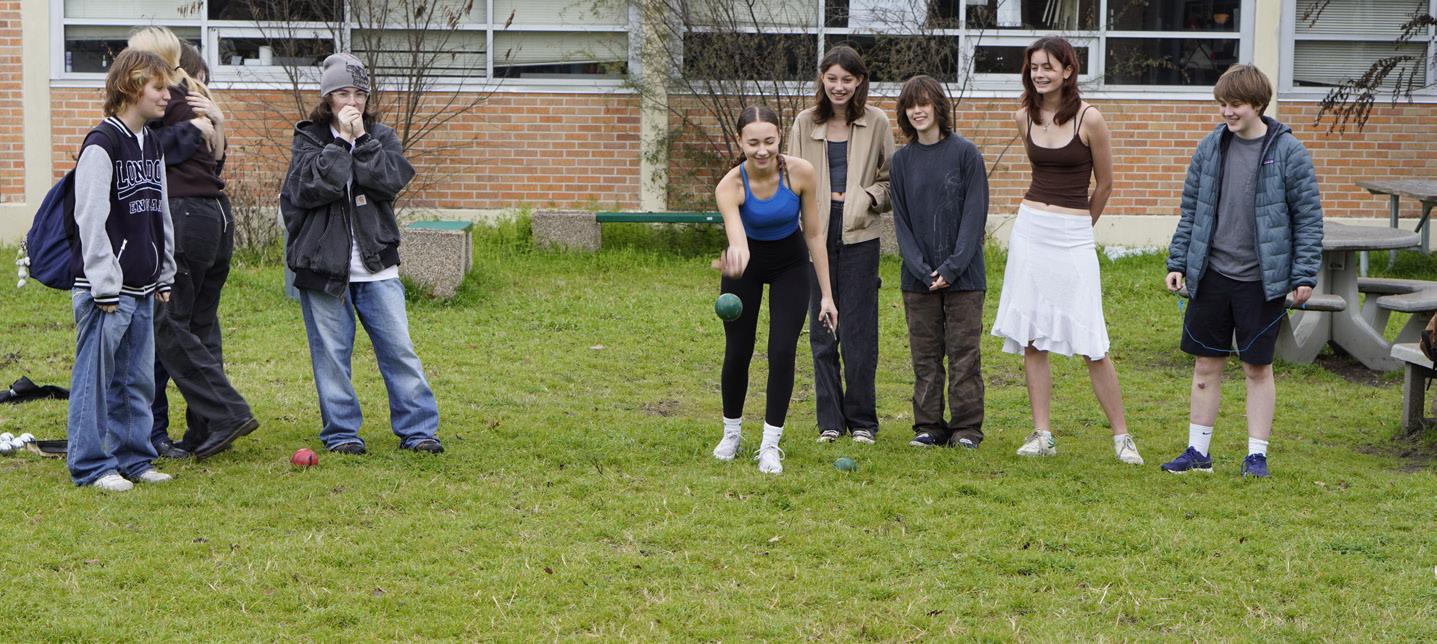
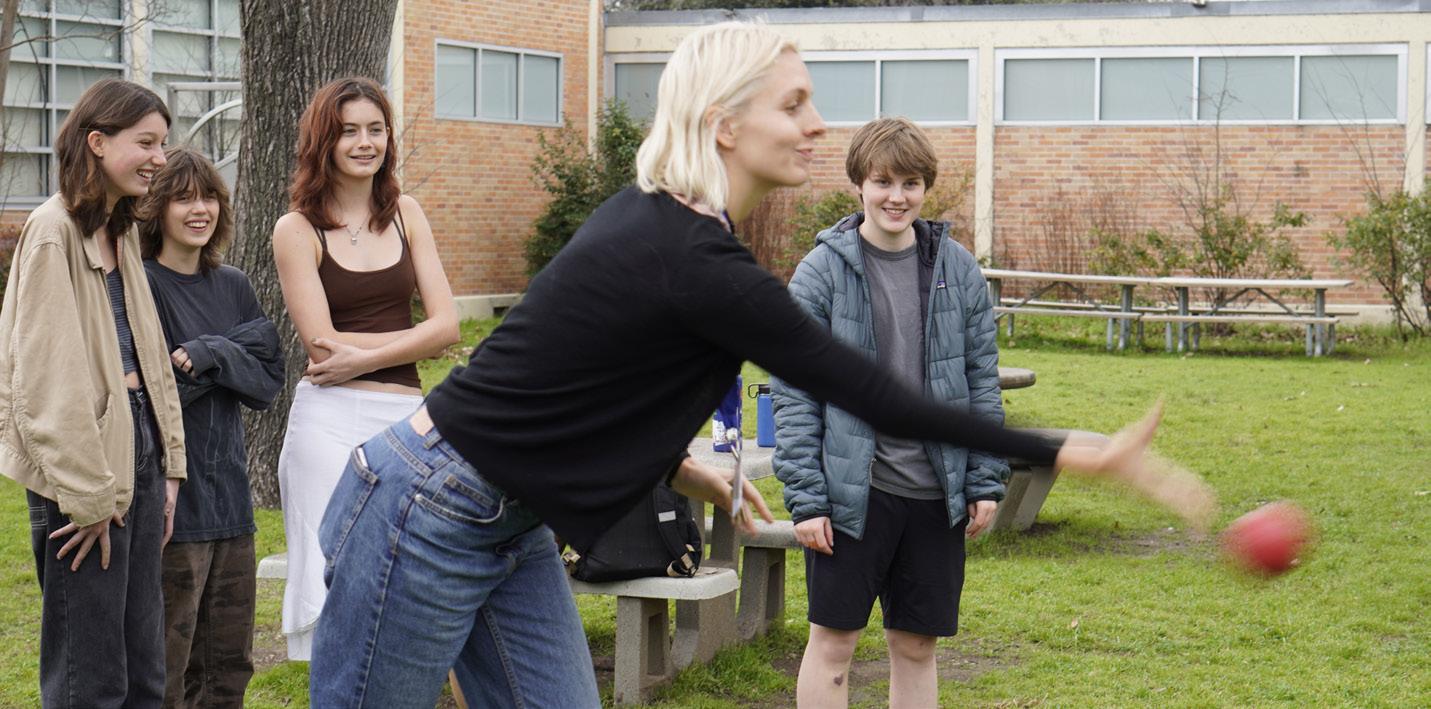
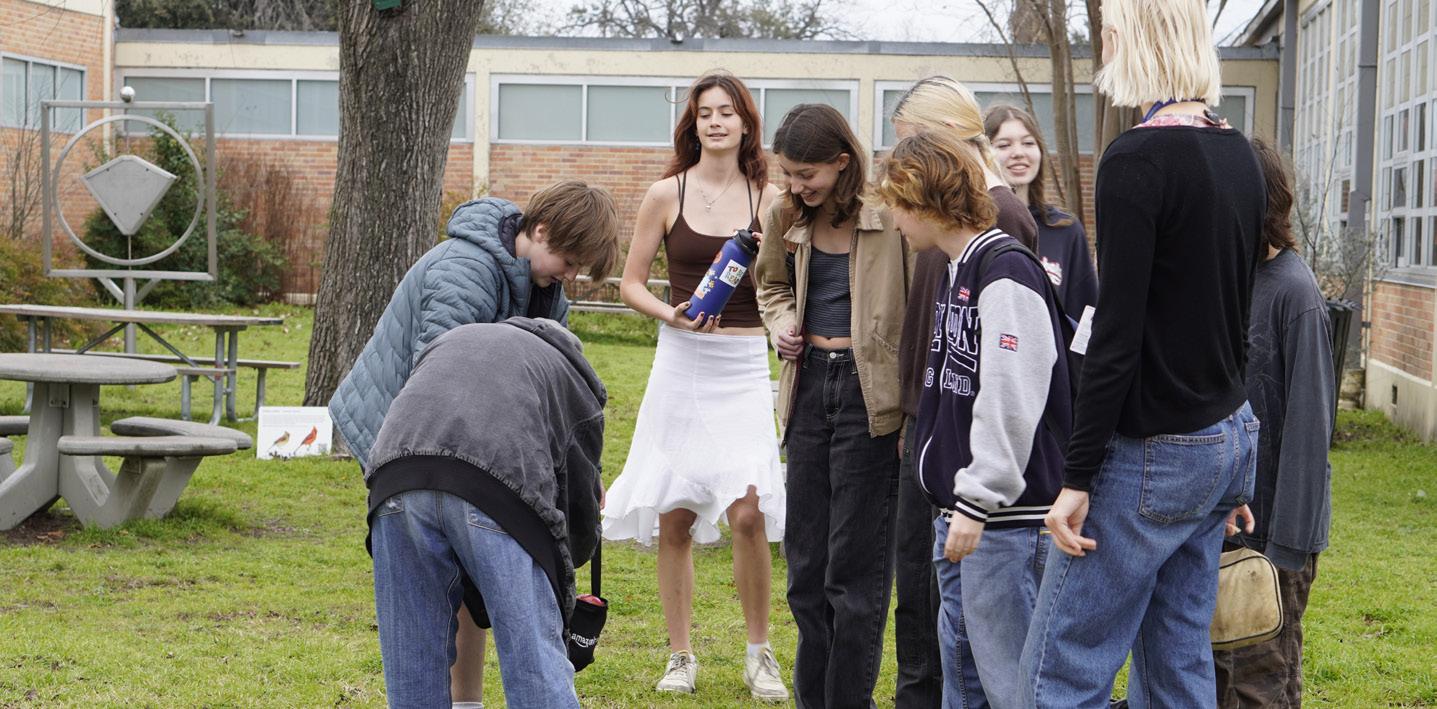
“I had a department meeting with the social studies people, and I already started asking questions like ‘Hey what like sports are y’all into? What equipment do y’all have?’” Priebe said. “Someone has bocce balls, and someone else had croquet. I think that is going to be our starting point of just seeing what we already have access
to and then, for those sports that would be a little more difficult to learn about and engage in, I think those might require some kind of fundraising.”
Milner agrees that fundraising is a big part of how the niche sports that are harder to access could be played by the club
“We could do little things like sell T-shirts or ask companies if they will sponsor us or give us access to their services,” Milner said. When talking to Milner and Loughlin, Priebe saw this club as a way to branch out, form connections and get involved with other clubs at McCallum.
“There’s an archery club, and a fly fishing club, and I feel like there are a lot of connections to be made there,” Priebe said. “I think there’s an ultimate Frisbee one too if they wanted to compete with them. So long term, if we could have some sort of partnership between other organizations, that would be really fun.
Priebe, who also didn’t know much about hobby horsing or niche sports, was excited to be the sponsor because it reminded her of what her high school was like.
“When I was in high school, I was the president of Goggles Club, and it reminded me a lot of that because it was something that started as, admittedly, a joke,” Priebe said. “But then we actually started going to Barton Springs, with our goggles. It was really fun and random, and this club kinda reminded me of that, so I was excited to sponsor it.”
While every month or so a new sport would be introduced, Milner had the idea to at the end of the year, the club could have a closure activity where the members of the club could play each sport that they have learned throughout the school year.
“I was talking to Ms. Priebe but we might want to do an end-of-year field day,” Milner said. “Maybe she could even take us on an in-school field trip or we could make one where we play all the sports that we learned.”
Sophomore Elizabeth Falkin, a member of the Niche Sports Club, said her interest in the club was piqued when she was sitting in Ms. Priebe’s room especially when she heard about the potential field trips.
“I was working in Ms. Priebe’s room and was intrigued by all of the member’s enthusiasm about niche sports,” Falkin said.
“I knew I had to join and thought learning about new sports almost every week and getting to go bowling or something like that would be fun.”
Though this club stemmed from a joke one day in class, Milner thinks this club can bring people together and provide a safe, fun space for everyone.
“We didn’t mean for it to be serious but we’re dedicated to campus unity,” Milner said. “We want to unite people through silly sports. No one’s going to be good at these sports. We will all be bad together.”
About two years ago sophomore Coda Becker attended his younger sister’s birthday party, which happened to take place at a bowling alley. Becker did not realize it at the time, but bowling would eventually evolve into a passion. Later down the road, he would even go as far as to qualify for a national tournament. But all that he knew in that moment was that he enjoyed the sport and wanted to do more of it.
“I found it to be really fun,” Becker said. “So I just kept practicing, and I got more into it, so I started taking it a little bit more seriously.”
Even though Becker just started competitive bowling within the last two years, he has already accomplished a lot. In November, he won first place at a qualifying tournament, which made him eligible for this year’s Junior Gold National Championship in July.
“Bowling has a lot of tournaments and qualifiers,” Becker said. “There are rounds —you play a tournament, you qualify for another tournament, and it just keeps going on.”
Professional youth bowler Garrett Andrus, a member of Junior Team USA, who has bowled with Becker, says that Becker has come a long way and foresees more success for him in his future.
“Coda is a great upcoming player who has been excelling in tournaments around the Austin and San Antonio area,” Andrus said. “I can see him becoming a well developed bowler, playing in events around the nation and even around the world. If he keeps working hard and putting in the work, he can become one of the best players on the PBA [Professional Bowlers Association] tour.”
Part of what Andrus believes makes Becker such a good bowler is his ability to improve, a strength Becker recognizes that has already taken him far.
“I’ve really made a lot of progress,” Becker said. “I’ve been practicing a lot. It’s really fun, and I’m going to keep working on my skills and keep practicing.”


This ability is what sets Becker apart from other bowlers in Andrus’ eyes. “He reminds me a lot of myself when I first started getting into competitive bowling,” Andrus said. “He shows grit and great strength through adversity, which inspires me to keep working at my game no matter how challenging it gets.”
Andrus feels Becker’s perseverance, along with his many other positive qualities, make him a great person to
“Coda is humble, kind, genuine and unassuming,” Andrus said. “He’s great to talk to about all aspects of the game and is eager to learn just as much as he is willing to teach you about the game.”
But Becker doesn’t limit himself to just bowling; he also plays basketball.
Playing two sports, he stays busy.
“It’s a little tough
on the schedule,” Becker said. “You wouldn’t think bowling would be, but if you do a lot of [competitions], then you’re always pretty active. Weekends, I have league; on Sundays I’ll go practice, and then all during the week I’m playing basketball.”
Junior George Brode, a basketball teammate of Becker’s, sees Becker both on the court and at the alley.
“
“I’m not a huge bowler myself, but my friend group is close friends with Coda, and we go [bowling] sometimes together,” Brode said. “Coda’s like a professional. He’s got his two custom balls, and he’s got his own shoes. And his form is great; it’s a lot better than mine for sure.”
“Bowling is not as physically taxing as basketball, but there’s a lot more that goes into it that a lot of people don’t understand,” Becker said. “It’s a complicated sport; there’s a lot of details, it’s not just rolling the ball down the lane and knocking all the pins down.”
Becker’s understanding of the sport is part of what Brode believes makes him so skilled.
I like them [basketball and bowling] both equally. I really like playing both, and I like them in different ways.
—sophomore Coda Becker ”
Even though he’s been playing basketball for a lot longer, Becker doesn’t favor it over bowling.
“I like them [basketball and bowling] both equally,” he said. “I really like playing both, and I like them in different ways.”
While the two sports are very different, both are similar in that they require precision.
“It’s just hard to wrap your head around because it’s hard to be good at two sports like that,” Brode said. “For that, I just gotta give him a lot of respect.”
Becker has always played basketball as his main sport, but his love for bowling continues to grow.
“I’m proud to go to a pretty unique sport where there’s fewer people, and no one’s really aware of it,” Becker said. “A sport like this is more fun to get good at because it’s obscure. Not many people would think, ‘Oh he’s a good bowler.’ Basketball’s awesome, but bowling is different.”
When the cheer season begins early August, the cheerleaders practice their stunts to ensure that their routines are perfected for game days. For senior captain Hannah Van Houten, and top 6 percent student, that means planning practices in the morning, practicing in the afternoon, all while balancing her heavy coursework.
One of the biggest factors that initially drew her to the cheer team at McCallum was the fact that freshmen could be on the team.
“For many other schools you have to wait till sophomore or junior year to try out, so that was a big factor for me,” she said.
Many of the members on the cheer team initially tried out to cheer for their school, but knew that it was a great opportunity to make friends and become close with their teammates.
“When I tried out for cheer, I made a bunch of new friends,” Van Houten said. “So I think it was good. A lot of my core friends came from cheer.”
Van Houten has the juggling academic and
“Its not too bad,” Van Houten said. “You just have to be on top of your time management because during football season, cheer takes up a good chunk of my time.”
Van Houten first heard she was highly ranked in her class shortly after winter break during her junior year, and was surprised because she wasn’t expecting her rank to change.
“I was both excited and proud that my hard work had paid off,” she said. “But it is definitely a little difficult [to maintain] at times.”
Close friend and fellow senior Sarah Hauck has long admired Van Houten’s achievements.
“I have known her since sophomore year and she is very studious.” Hauck said. “She is always going to put 100% into all of her assignments and help out other people that need it. It is definitely something she prioritizes.”
Van Houten works hard to maintain her success in academics and athletics and believes the key is striking a balance so neither pursuit leads to burnout.
“It is definitely a little difficult at times,” VanHouten said. “But I am pretty good at
cheerleaders have to be at every single game and have after-school practice often, so using her limited free time efficiently is a must.
“During basketball season our schedule lightens up a bit so balancing cheer and school becomes a little easier,” she said.
“ [Hannah] puts her friends and school and cheer first and that just makes her a really great person.
senior Sarah Hauck
Doubling up in the spring season, Van Houten also participated in track freshman through junior year.
“Track practice is early in the morning so I got less sleep and didn’t ever have time to do any school work in the mornings, which was difficult on some weeks,” she said. “Most of the time I would just check with my teachers ahead of time to see what work I would be missing on track meet days so I could not get behind in my classes.”
As captain, Van Houten has been helpful to first year and newly appointed head cheer coach
”
Sydney Schriever.
“Right now I am trying to learn as much as I can about cheer so I can be a useful coach and not just a warm body in the room making sure that they don’t get hurt.”
While she hasn’t known Van Houten for very long Schriever says that she has made her job easier.
“Hannah is super organized, so she’s very good about making sure we’re on time for what we’re doing,” she said. “She’s pretty good at cleaning up dances and giving back critique in a way that is heard by her peers in a productive way.”
It’s a quality that Van Houten brings to all her interactions. Hauck says that Van Houten is a leader not just in athletics but also in the academic and personal spheres.
“Overall, I think she just has her priorities straight,” Hauck said. “She puts her friends and school and just cheer first and that just makes her a really great person.”
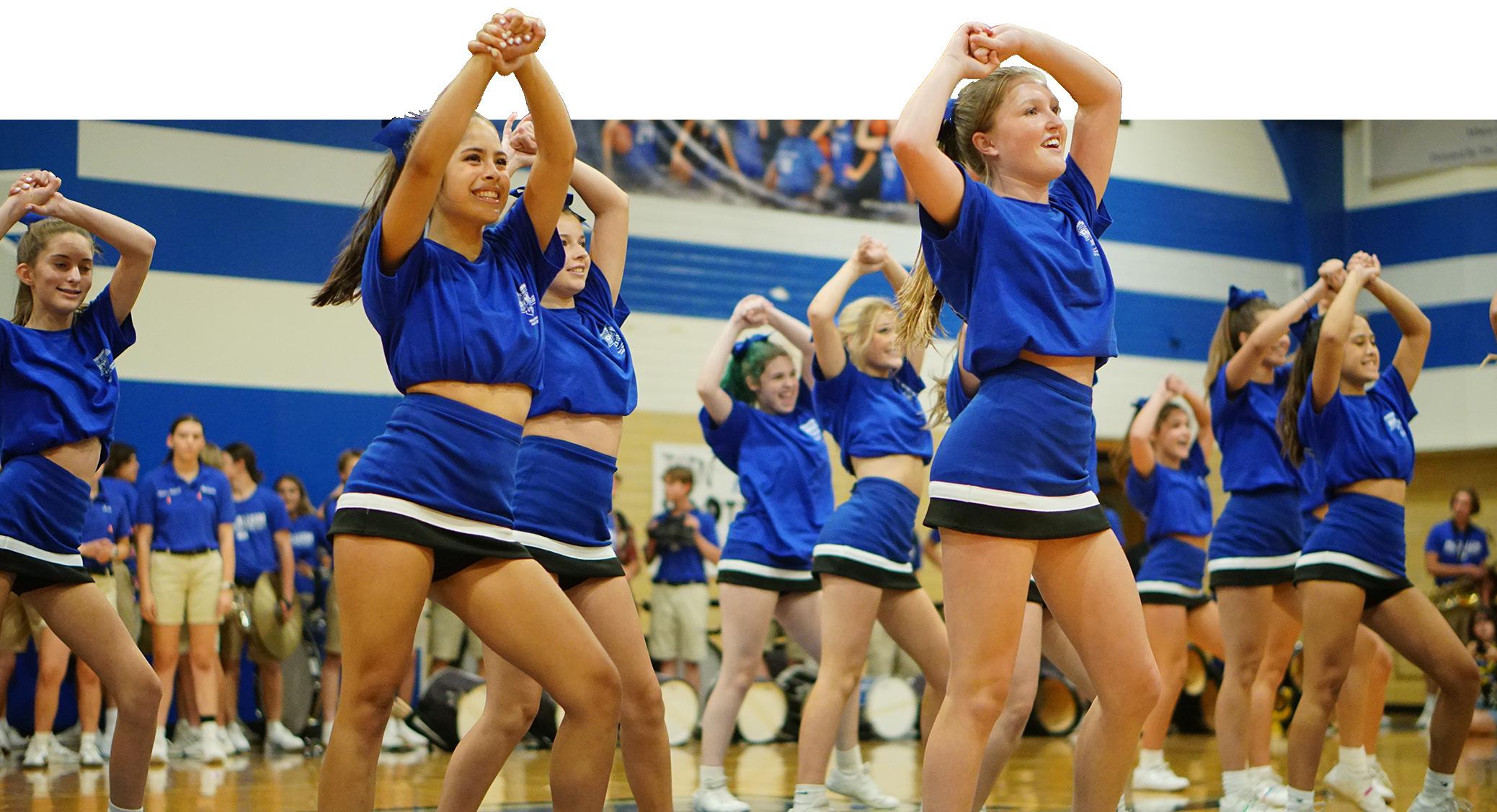
Sofia Saucedo staff reporter
Next school year, McCallum is set to welcome its very own turf field. Coaches and players believe that the change will bring athletic programs new opportunities to grow and improve on and off the field.
Athletic director and head football and girls varsity soccer coach Thomas Gammerdinger has previously reaped the benefits of having a turf field. Seeing that football games are played at turf stadiums, Gammerdinger knew right away that the change from dirt to turf was much needed.
“I see no disadvantages to getting turf fields,” Gammerdinger said. “It’s going to improve play, and it’s also a lot safer to play on.”
Gammerdinger also knows the advantages of having nicer facilities to practice and play on, and how those improvements can affect not only individual players but entire programs as well.
“For football, having a good surface is safer for impacts and being brought down to the ground a lot more,” Gammerdinger said. “And as for soccer, a smooth playing surface is critical because we’ve been out there practicing, and I notice how hard it is to get a good pass in when every other square foot is a hole in the ground.”
The biggest concern Gammerdinger has is with player safety after seeing the uneven and dusty terrain that is currently the McCallum fields.
“I think that grass fields can be safer than turf fields at times, but the problem is we don’t even have a grass field,” Gammerdinger said “ What we have now is dusty and uneven rock, which is obviously not safe for any sport.”
With the field upgrade, sophomore soccer and football player Jax Hicks feels a weight lifted off of him, knowing that there will be less of a risk when stepping on the McCallum field to play.
The rough layout for the new field and facilities, including new stands, track, and sidewalks. Drawing by CEI Engineering Associates, Inc.
“Now that we are getting a different field, it’s not only going to be easier to play on, but safer as well,” Hicks said. “I know that now that we have these facilities, it’s going to take away the problem of having all of the holes in the ground, which can be dangerous if
you step in them and twist your ankle.”
Another benefit to having these fields will be the continuation of practices. As the seasons get colder and wetter, the current fields have caused many problems with flooding and muddy conditions. Adding in sustainable fields will allow for more practices and games to be played through the rainy conditions.
“[The turf] ensures we can stay practicing in the rainy months and increase the overall quality of all of the practices of the sports that use the field,” Hicks said. “Pretty much all of the soccer practices for one week were canceled due to the rain, and that won’t happen once we have turf.”
The girls JV soccer game on Jan. 24 was set to be hosted at Noack but was canceled due to field conditions. Freshman JV girls soccer player Athena Wintle was one of the soccer players affected by the constant cancellations
from problems with weather.
With the addition to the fields, other teams will be brought to McCallum, in order to provide the best hosting field for several games.
The 2022 bond additions will also take away some of the wear and tear of current hosting facilities.
“The purpose of this [investment] is of course to offer better facilities for schools, but also to relieve some of the pressure, and conserve our current playing fields like House Park, Burger, Nelson and many more,” Baxa said.
“It just is so unfortunate to look forward to playing our games and putting in all our effort to prepare, just to find out that we can’t play just because of a little rain,” Wintle said. “This is probably why I am most excited about the new fields because problems like this will be avoided in all, and we can just start hosting games at Mac.”
“So [the field] is all a part of the new AISD bond package, and every high school gets a certain amount of money in order to install a turf field, lights, bleachers and maybe even a little concession stand,” principal Andy Baxa said. “It’s exciting because now McCallum will be equipped to host middle school games and JV sports games here.”
Per the AISD bond package, every high school, not just McCallum is set to welcome new turf fields, in order to not only provide a place for their athletes on each campus to play, but the fields will offer a reliable place to host JV games, and each school’s respective middle school will also be offered a reliable place to play.
“It’s vital that we get in a good practice for all teams, and the current fields just don’t accommodate for any of that,” Gammerdinger said. “And now that we have these fields, we can play sub varsity games here on campus, which is just generally easier, not to mention the lights, so now we can host games but also run practices later.”
The current McCallum field has served its purpose, but coaches and players are ready for the change. The fields will begin construction by the end of this year, and will be usable just in time for the 2024 football season, which will come with improved safety, reliability, and even terrain for all to enjoy.



The Knights challenged Cedar Creek on March 26 and beat them 7-5 at House Park to take the bi-district title. According to senior Kat Klein, the game started “rough” with Cedar Creek quickly scoring two goals on the Knights, but Klein and her teammates didn’t let that deter them. By the end of the first half, the advantage had flipped as McCallum brought up their score to four over Cedar Creek’s three. “The game was probably the craziest game I’ve played for McCallum,” Klein said. “It was so much fun to score so many goals, and we fought back from being down. We knew we could do it, we just had to turn on defensively.”
Moving into the second half, coach Thomas Gammerdinger urged the Knights to get “just one more goal.” His players took that to heart and scored not just one but two more goals.
“They ended up scoring five so one goal wasn’t enough anyway,” Klein said. “We just wanted as big of a bumper for ourselves as we could get.” The Knights earned the right to play the fourth-seeded Patriots by winning the district title with a 2-1 triumph over Ann Richards on March 8. Losing would have meant placing second in district for the second year in a row and handing the title to LASA, who had been a competitive opponent throughout the season. The teams tied 1-1 in their first meeting on Jan. 24, and Raptors edged the Knights 1-0 on Feb. 23.
Because the Knights triumphed over all other district foes, however, they took home the title. Freshman Maya Garwood scored both of McCallum’s goals against the Stars, one in each half.
“I’m beyond thrilled,” Garwood said of the game’s result and her role in earning it. “This was such a fun way to end the season.”
The Knights will play against Magnolia later this week in the area round of playoffs at a date and site to be determined.
—Francie Wilhelm, Julia Copas and Lanie SepehriAfter outscoring three district opponents 48-3 in midMarch victories over Navarro, Travis and Eastside to bring their district record to 6-1, the varsity softball team lost the rubber game of their three 2024 battles against the Crockett Cougars Tuesday night at Noack Fields.
The Knights entered the game in second place, one game ahead of the Cougars and a game behind LASA, who edged the Knights 5-4 on March 8 in a battle of district unbeatens.
On Tuesday, the Knights fell behind to the Cougars early and could not recover. The Cougars scored two runs in the first and three in the second before the Knights broke through for a run in the third on Isabel Vaca’s two-out RBI single that plated Caroline Bell, a courtesy runner for Lexi Niles-Arguello who led off the half inning with a single.
Lead-off hitter Lila Brotherton had two hits in the game for the Knights. Grace Yemington singled in the game.
Crockett sophomore pitcher Rhiannon McKinney pitched a complete game to earn the win by a 15-1 final score, allowing one run and five hits while striking out three.
The game was a marked departure from the first district game between the two teams, a 10-3 Knight victory in the district opener for both teams on Feb. 20. The game was significant for another reason: it was the first varsity softball victory for McCallum over Crockett in four years. Crockett beat the Knights 6-3 in the AISD Varsity Tournament championship game on Feb. 24.
The Knights return to the diamond on Tuesday, April 2, when they face the Northeast Raiders. They face a key rematch with the LASA Raptors on April 5.
—Lillian Gray and Dave Winter
April 2
Baseball vs LASA
Varsity @ Burger - 5 p.m.
JV 2 @ Nelson - 5 p.m.
JV 1 @ Nelson - 7:30 p.m.
Softball vs Northeast
JV @ Noack 4- 5:30 p.m.
Varsity @ Noack 4- 7 p.m.
April 3
JV Baseball vs LASA
JV 2 @ Nelson 5 p.m.
JV 1 @ Nelson 7:30 p.m.
As has been the case for many seasons, the 2024 varsity baseball team is starring a story that could be entitled, A Tale of Two Seasons. With Tuesday’s Game 1 victory in this week’s two-game series with Northeast, the Knights remain perfect in district play at 5-0 with sweeps over Crockett and LBJ to go along with Tuesdays’ win over the Raiders.
The Knights have won their district games by a collective 63-4 score, and three of the five wins were shutouts. Prior to and during district play, however, the Knights have played non-district opponents inconsistently. In those games, the team is a pedestrian 7-9 with victories over Burnet, Belton, Del Valle, Westlake, Carroll, Elgin and Hendrickson and losses to Big Spring, Marble Falls, Fredericksburg, Leander Glenn, East View, Leander, Vandegrift, Jesuit Dallas and Dripping Springs.
While the non-district record may cause concern among casual Knight fans, the team’s victories against tough competition should allay any fears that this team is anything less than prior editions.
The victory over Westlake on March 2 was a signature win for the team and marked the second time in four years that the Knights have bested the perennial 6A powerhouse.
Senior pitcher Sam Stevens stood out against Westlake, earning the win after pitching six innings while giving
up four hits, no earned runs with five strikeouts. Senior Nico Sanchez pitched the seventh, striking out three and stranding three to end the game.
“Winning a big game like that is exhilarating,” Stevens said, “and I wanted to embrace that feeling.”
Another star moment for Stevens came against Burnet, coached by legendary former Mac coach Russell Houston. Against the Bulldogs, Stevens came within a strike of throwing a perfect game but settled for a complete game one-hitter. In the same game, freshman Tommy McIntrye hit his first high school home run.
After Game 2 against Northeast on Friday, the Knight play LASA in a two-game series next week. —Callen Romell and Dave Winter

After winning its final district game against the Eastside Panthers, the boys varsity soccer team advanced to the bi-district playoff round against the East View Patriots. Scoring within the first 10 minutes of the game, the Patriots secured the win, 1-0, to advance and end the Knights’ season. 0
According to senior Tucker Martinson, the Patriots made it hard for the Knights to come back after yielding the initial goal.
“The game started off slow and they were keeping the ball and pressing us high,” Martinson said. “We played a lot better in the second half, and it seemed like we were in control, but we just couldn’t score.”
Senior Ohad Klein said that the team gave it their all and that the disappointing loss can’t diminish the growth of the team this season.
“Everyone’s definitely sad, but we were really happy with how we did because we got second in district and we had a really good season.” Klein said.
—Chloe Lewcock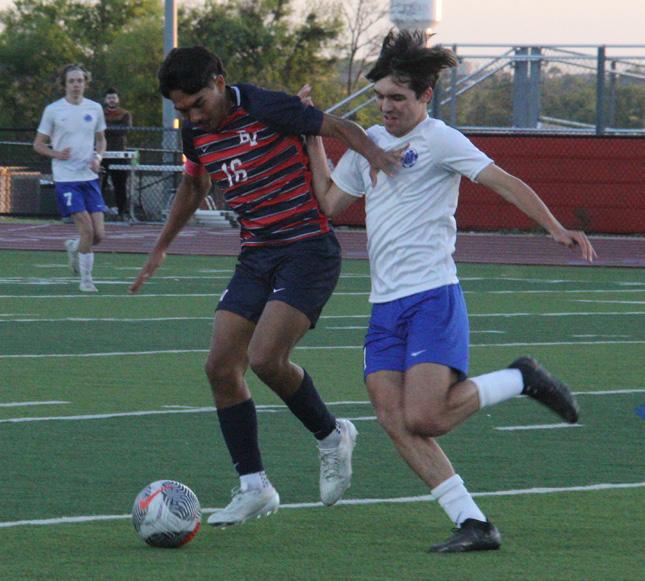
On Feb. 12, Principal Andy Baxa announced in a newsletter to parents that a new tardy policy had been implemented. He stated that from now on if students have more than two tardies in a week, they will have to serve lunch detention. Assistant principals will run a tardy report at the end of each week to identify students who exceeded the limit. This change aims to decrease student tardiness. I can completely understand our administration wanting to have us be on time for our classes, but I think this new change is horrible for us. It will put more stress on students throughout our routine since we will now have to be cautious of not being late and will have to give our their lunchtimes.
In my morning classes, I have noticed some of my classmates arriving late. Administration might assume that students are late because they are either talking to their friends or avoiding class, but one factor the administration might have not taken into account is students’ proximity to the school. Some students might not live near or their
parents might not get them to school on time because of traffic. It is extremely unfair that students who are simply just late will get a punishment at a similar level of students who violate school rules like vaping and vandalizing school property.
Why does my lunchtime have to be sacrificed just for being a few minutes late to class? Lunchtime is a time in my day that comes very in handy when I need help in math class. I can not arrive early due to my dad dropping my sister off and no one can pick me up after school. So now if I get lunch detention, I will not be able to get help on homework assignments that I need to turn in. Not to mention that I am a senior, so I would like to spend as much time as I can with friends with whom I don’t have classes before we graduate. This new policy can prevent me from creating memories with my friends.
One thing that confuses me is how will they fit every single student who is late more than two times a week? In a classroom, the maximum capacity of students is usually between 30 and 35. Let’s say that about 150 people have more than two tardies a week. How will they all fit in there? It would take five
classrooms to have all of us fit. Also what if some of us want to go get lunch at the cafeteria but have to report to detention on time. Will we just starve throughout the rest of the school day?
There are better alternatives to solve this problem; for instance, the administration could have teachers do warm-ups at the beginning of class that can only be completed in the morning and are worth a certain percentage of their grade. This would alleviate the logistical stress that this new policy will bring to all of us: students, teachers and administrators.
Graphic by Sophie Leung-Lieu.What do you think about the new lunch detention policy?
On an Instagram poll posted on @macjournalism, we asked students for their thoughts on the changes in tardy rules and punishments.

“ A method for the minority that affects the majority.
It doesn’t give wiggle room to students in carpool or city transport and is unfair. senior Rowen Lee ”
junior Maya Starkloff
“ ”
senior Chloe Marco ” “ It’s logistically a nightmare and isn’t going to work.
“
Students shouldn’t have to accommodate for poorly planned schedules. Being told to “walk faster” doesn’t help anyone.
junior Ryan Bookout
The reusable water bottle, a staple for an environmentally friendly lifestyle, has, in recent years, become environmentally unfriendly. Water bottle trends like buying Hydroflasks and most recently, Stanleys, have taken over the internet and consumers’ wallets. As social media quickly promotes these products, consumers rush to stores to get their hands on the latest bottle despite already owning one, which makes the eco-conscious goal pointless.
According to CBS News, Stanley, the company behind the latest water bottle trend, made an estimated $750 million last year, compared to $70 million before 2020. The trendy Stanley cups aren’t the only reusable water bottles that had their moment of internet fame.
Hydroflasks, which saw a large increase in sales in the late 2010s, were a brief trend that lasted a little over a year. After this cup started to go out of style, buyers moved onto other cups like Stanleys.
The quick change from bottle to bottle due to internet popularity totally defeats the purpose of water bottles in the first place. The use of reusable water bottles is to decrease the use of plastic water bottles and reduce waste. But with our culture of moving on from things so quickly and buying the new popular item, it seems to be doing more harm than good.
In the past year, as Stanleys began to grow in popularity, I have known multiple people who have bought more than one Stanley. I don’t understand this since I have had the same water bottle for over a year and, it still works just like it did when I got it. Stanleys also say that their cups “last a lifetime,” which has been proven to be true due to events like a woman’s Stanley cup being caught in a car fire and surviving, barely damaged, a story she relayed on Tik Tok.
This begs the question, if the cup is so durable and should last for such a long time, why are consumers collecting and buying multiple cups?
For starters, although the company knows the cups’ durability, it promotes its new cups in a way that makes consumers want to buy more. Stanley has posted videos talking about the different cups and their
has become discontinued due to its high demand and crowds that were too eager to get the cup. Now the cups are selling for over $300 on resale sites.
As the Stanley company continues to build hype around the bottle and market it as a collectible and not a way to combat harmful plastic water bottles, people will continue to buy more than they need.
Many influencers have made videos showing off their Stanley cup collection that consists sometimes of 10 or more cups.
Even though more people are buying

Buying multiple Stanley water bottles defeats the environmental purpose of buying a water bottle in the first place. Graphic by Sophie Leung-Lieu
reusable water bottles due to these trends, which should be a positive effect of the hype; instead, overbuying the water bottles and getting more than what people actually need is having a negative impact on the environment.
Although the company knows of its cups’ durability, Stanley promotes its new cups in a way that makes consumers want to buy more.
”Although I believe that water bottles are a good way to combat plastic waste, they have become too much of a trend to the point that the bottles are not effective towards their original environmental purpose. I think that everyone should have a reusable water bottle, but should try to keep it for a long time and not just get rid of it as soon as the newest trend emerges. The point of water bottles is to reduce waste but it seems that the growth of these trends lead people to buy them in excess, which creates more waste.
Stanley’s overall revenue has grown from $70 billion in 2019 to almost $750 billion in 2023.
Data from CNBC. Infographic by Lillian Gray.

Just over 200 miles south of Austin is a small town called Eagle Pass. It is a littleknown settlement that is most recognized as being home to the historic ruins of the 18th century San Bernardo Mission and for being the first American settlement on the Rio Grande. It became a more relevant area during the 19th century for being the quickest route between Mexico and San Antonio, which is sometimes referred to as “La Puerta de Mexico,” or Mexico’s Door. But recently, the town of just over 28,000 residents has been thrown into a political battle over its border with Mexico.
The economies of small American towns, similar to Eagle Pass, are very important for the health of the country, and it is imperative that U.S. authorities protect the lives of every immigrant attempting to cross the southern border; nevertheless, our elected leaders must take steps to curb the mass amounts of illegal crossings that are impacting first responders, especially in southern cities.
The situation at the southern border is extremely serious. A record high number of illegal immigrants coming into the country, while border patrol and police officer numbers are down, poses a threat to southern border communities like Eagle Pass. The city relies on its two international bridges to supply revenue for 50% percent of its annual budget. Since November, the U.S. Customs and Border Protection has temporarily suspended traffic from Mexico into the U.S. at one of the Eagle Pass bridges. According to city officials, Eagle Pass is losing up to $80,000 a day in revenues due to the temporary closure of the international bridge.
Number of migrant encounters at the United States-Mexico border by fiscal year. Data sourced from the US Customs and Border Control.


pandemic under former President Donald Trump, which allowed U.S. officials to turn away migrants attempting to cross the border on the grounds of preventing the spread of COVID-19. Prior to the policy, an immigrant
“ Politicians are elected to work for the people that they represent, not for their personal interests and campaigns.
southern border illegally could apply for asylum and be allowed into the country. Under Title 42, however, migrants were returned and denied the right to seek asylum. According to the Associated Press, more than 2.8 million migrants were turned away from entering the country by U.S. southern border officials under Title 42.
“ It is vital that our elected leaders take steps to curb the mass amounts of illegal crossings.
The federal government sued the city of Eagle Pass in January 2008 as it attempted to gain access to the town’s property and construct a fence along the U.S.-Mexico border. In May of last year, President Joe Biden ended the “Title 42” policy created during the coronavirus
”
Since the Biden administration ended the Trump-era policy, the southern border has seen record numbers of migrants attempting to enter the United States. Eagle Pass saw a total of 4,095 undocumented immigrants encountered by the U.S. Border Patrol on Dec. 20. Record numbers like those in Eagle Pass are not uncommon to many border towns in Texas like Del Rio, which became the second busiest border crossing with 71,095 arrests in December 2023 alone.
”
The high influx of illegal border crossings have caused local and federal governments to take important steps to deter migrants from making the dangerous journey across the Rio Grande River and into the United States. Some leaders, however, have put politics over impactful policy. Gov. Greg Abbott has been at odds with the Biden administration ever since the federal government sued the State of Texas’s use of razor wire and buoys on the southern border to curb the increase of illegal crossings. In August, border officials discovered two bodies in the Rio Grande near Eagle Pass, one of the areas where the Texas government added buoys. The U.S. Supreme Court recently sided with the Biden administration to allow border patrol agents to cut and remove the razor wire across the border, which has only enhanced tensions between federal and state authorities. Gov. Abbott is preoccupied with petty politics to appease the leader of the Republican coalition, Trump, instead of working across the aisle to achieve a solution to the border situation. There is, however, a bipartisan effort in the U.S. Senate to offer legislative solutions to the surge of migrants. A group of senators and negotiators from the White House have neared an agreement that
would fund Ukraine, Israel and Taiwan, while reportedly setting a limit on the number of migrants that can come across the border. It is difficult, however, for legislation to pass in an extremely divided Congress. The agreement is at risk after Trump recently claimed that “a border bill is not necessary.” Why would a person who, for months, has claimed the Biden administration is not doing nearly enough to stop the surge of illegal immigration at the southern border not support vital legislation? Because Trump is a politician and a candidate running to achieve the second term he failed to win in 2020. The optics of Biden being able to pass bipartisan immigration legislation into law would presumably undercut Trump’s criticism and might even raise Biden’s low approval ratings.

Politicians are elected to work for the people that they represent, not for their personal interests and campaigns. The current situation at the border is extreme, and it should be considered a crisis. The president’s current actions are insufficient to stop the surge of illegal southern border crossings, but at least the Biden administration is attempting to work with Congress for a substantial, bipartisan bill. Politicians need to work together to help small towns like Eagle Pass. They must stop petty legal fights in order to protect the lives of those crossing the southern border to start a new life. Graphics by Nate Williams.
“As opposed to detaining legal immigrants, Biden has let them all loose with no ability to accurately determine their whereabouts.”
—Gov. Greg Abbott (R)
“Frankly, [Congress] owe[s] it to the American people to show some spine and do what they know to be right.”
—President Joe Biden (D)
“I think President Biden really mishandled this from the very beginning, and I think in his race it’s going to be huge.”
—Sen. Mitch McConnell (R)
Shield staff
New school rule. Rinse. Repeat.
In terms of policy, the first semester was pretty quiet, excluding the construction of a fence around the campus after the school year began. But the spring semester thus far has been one new policy after another after another. A new bathroom sign-out system. A new FIT system and new guidelines about when clubs can meet. New rules about how many periods you can miss and still earn credit for the class. Most recently, a new tardy policy that could leave students in lunch detention.
The problems these new policies are meant to address, such as absence and tardiness, are persistent and detrimental to the learning environment, but drastically changing school policy well into the school year won’t solve them; instead, it creates an environment of constant change where stability is needed and makes it impossible for administrators to create lasting, effective norms.
Constantly changing or implementing new policies creates an unstable learning environment, which is exactly the opposite of what students need. While change is a part of life and we must learn to adapt to it, school is a place that teens should be able to count on for consistency and security. Rules are meant
to provide clarity. When they’re constantly changing or being replaced, however, they confuse those who are supposed to obey them. This is already a tumultuous time for many students. Right now, high school makes up our whole world; we don’t need the structures of that world to be in constant flux. Additionally, it’s a bit late in the year to make such drastic changes. The school year is nearly over; why change the rules of the game at its end? It feels unrealistic to ask students to respect a new rule when they’ve done things differently for the whole year. These policies target important issues and could make a positive impact if implemented at the right times. Perhaps administrators should simply take note of persistent problems and save their solutions for the fresh start of the next school year. New year, new rules, right? Finally, ceaseless change makes it impossible to create lasting norms. FIT and tardies, for example, have changed multiple times throughout the year, making it difficult to remember which system is the most current. What’s more, the constant rate of change creates a sense that all rules are temporary. Students are disinclined to adjust to new rules if they feel they’ll change again. To encourage obedience, administrators should stand firm on the policies they already
print managing editor
Caroline Owen web managing editor
JoJo Barnard social media managing editor
Naomi Di-Capua design editor
Sophie Leung-Lieu news editor
Morgan Eye
a&e editor
Eliza Jensen people editor
Chloe Lewcock sports editor
Camilla Vandegrift opinion editor
Nate Williams staff reporters
Kyan Adams
Noah Braun
The Shield is published by journalism students in the newspaper production class. Although students work under the guidance of a professional faculty member, the student staff ultimately determines the content. Students may not publish material that is obscene, libelous or that which will cause a “substantial disruption to the educational process.”
Content that may stimulate heated debate is not included in this definition.

have in place. The administration has a right to shape school policy as it sees fit; that’s its job. But to effectively do this, school leaders should consider the timing and effectiveness of the policies they’re creating. Administrators should wait until the next school year to implement changes and hopefully see widespread results. Even better, perhaps the
administration could focus on what causes the persistent issues of tardiness, classskipping and absence instead of dealing out punishment as they happen. Understanding why students miss class could nip these problems in the bud, negating the need for constant policy change because, in the end, patching leaks as they spring up won’t stop the boat from sinking.
Dylan Bryl
Julia Copas
Tristen Diaz
Gaby Esquivel
Shila Gill
August Gleason
Lillian Gray
Evelyn Jenkins
Helen Martin
Maggie Mass
Emerson Merritt
Josie Mullan
Ephraim Paprock-Schue
Mira Patel
Winnifred Roberts
Raul Rivas Jr. Callen Romell
Tito Ruetz
The Shield operates as an open forum for exchange of ideas. Opinions expressed in editorials are the ideas of the staff. Opinions expressed in the columns are that of the writer’s alone.
Letters to the editor are encouraged and must be signed. Positive identification may be required when a letter is submitted. Letters may be edited.
Letters that are critical of the newspaper staff’s coverage of events or that present information that
Sofia Saucedo
Chloe Seckar-Martinez
Maya Tackett
Priya Thoppil
Elena Ulack
Hadlee Varela
Lucas Walker adviser
Dave Winter
may stimulate heated debate will be published. Letters that contain malicious attacks on individual reporters, the adviser or the principal will be rejected.
Anyone interested in purchasing an advertisement should contact Shield adviser Dave Winter by phone at (512) 906-5407.
Advertisements published in The Shield do not necessarily reflect the opinions of the staff.
See our socials:

Advertising in The Shield—in our print edition or on our website—gives you a chance to give your business wide exposure while at the same time showing your customers that you support McCallum High School and the community we serve with our publications.
Analytics reveal that advertising in The Shield Online makes a big splash. A recent website ad (a sidebar and in-story ad) received a total of 139,621 views and 105 clicks.
Advertising in The Shield is affordable. It’s effective. It’s altruistic. And it’s a good investment.
Please consider advertising in the Shield now and during the 2023-2024 school year.
If you are interested in advertising in The Shield or The Shield Online, please contact adviser David Winter at david.winter@austinisd.org.

Subscribe to our reporters by installing the Student News Source App available in iOS and Android app stores. @macjournalism
To find more exclusive stories from MacJournalism, visit our website at macshieldonline.com

1. MacJ’s spin-off of the popular New York Times word game
2. The time off school from March 11-15 was ____ break.
3. Through March, The Shield is conducting its “Support ____” fundraiser.
4. The varsity team that beat Westlake on March 2 plays this sport.
5. McCallum’s 2023 teacher of the year
2. A top trending water bottle mentioned on page 29
6. The hashtag featured in MacJ’s Instagram bio
7. The maximum number of tardies students can receive before earning a lunch detention according to the new policy (pg. 3)
8. Sophomore Ru Motwani’s club is called ‘You Can Be a ______’ (pg. 14).